Democracy in dark times .. Canada votes 2008
Oct 14th, 2008 | By Randall White | Category: Ottawa Scene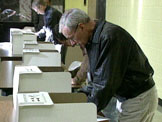 OCTOBER 14, 11:20 PM. [UPDATED OCTOBER 15 BELOW]. Some will say it`s a little too close to a Conservative majority for comfort. The exact results of Canada’s 40th federal election remain uncertain at this still comparatively early hour. But it is quite clear that Stephen Harper’s Conservatives have done considerably better than some of us quite expected and/or hoped. They have not won even a bare majority of seats in the Canadian House of Commons. But at this exact moment they are just a dozen or so short of the magic number of 155 in a 308-seat House – with somewhat better than 37% of the popular vote.
OCTOBER 14, 11:20 PM. [UPDATED OCTOBER 15 BELOW]. Some will say it`s a little too close to a Conservative majority for comfort. The exact results of Canada’s 40th federal election remain uncertain at this still comparatively early hour. But it is quite clear that Stephen Harper’s Conservatives have done considerably better than some of us quite expected and/or hoped. They have not won even a bare majority of seats in the Canadian House of Commons. But at this exact moment they are just a dozen or so short of the magic number of 155 in a 308-seat House – with somewhat better than 37% of the popular vote.
The Liberals have similarly done considerably worse than some of us expected and/or hoped – some 75 seats at the moment, with somewhat better than 27% of the popular vote. Right now the New Democrats seem to have 38 seats with more than 18% of the vote. However you look at it, and all things considered, in the end Mr. Harper has done rather better than well enough.
Just what the results mean for how federal government and politics in Canada will unfold over the next few years is not entirely clear. But Mr. Harper has certainly won a stronger mandate than he had before (although he has done not so well in Quebec, very badly in Newfoundland and Labrador, and not so well again in Montreal, Toronto, and Vancouver).
His instinct will no doubt be even more to govern as if he does have a majority – and he will likely enough be able to get away with it for a while. (And all the talk of an opposition governing coalition will probably suddenly vanish, for at least a while as well.)
11 Theses on Jack Layton (and the lovely Olivia Chow): [OCTOBER 15, 12 NOON].
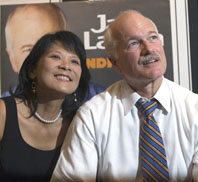 1. Jack Layton’s epitaph is now clear: “Here lies the person who made Stephen Harper prime minister of Canada … not just once but at least two times.”
1. Jack Layton’s epitaph is now clear: “Here lies the person who made Stephen Harper prime minister of Canada … not just once but at least two times.”
2. The 2008 Canadian federal election was a marginal exercise in political arithmetic. Stephen Harper’s Conservatives increased their share of the popular vote by 1.3% and won 19 more seats. The New Democrats increased their share of the popular vote by 0.8% and won 8 more seats. The Green Party increased its share of the popular vote by 2.3% and won no seats, again. The Bloc Quebecois’ share of the popular vote declined by 0.5% and it lost one seat. The Liberals’ share of the popular vote declined by 4%, and they lost 27 seats.
3. No wonder the overwhelming majority of respondents to the Globe and Mail online poll question “Now that we have another Conservative minority government, do you think the federal election was worth the time and money spent on it?” answered “No.”
4. No wonder the CBC is cautiously reporting: “An estimated 59.1 per cent of Canadians cast votes in Tuesday’s general election – a figure that appears to be a record low in the history of Confederation.”
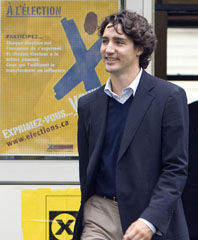 5. “I think under any scenario where we lose seats, Dion must go,” a party strategist who has worked with Mr. Dion and his two predecessors told The Globe‘s Jane Taber. Another long-time Liberal said on Tuesday night: “It will be tough for him to have the authority to lead. We are the natural governing party.” Wrong. The 26.2% of the popular vote won by the Liberals on October 14, 2008 also “appears to be a record low in the history of Confederation.” There is no such thing as a natural governing party in Canada nowadays. And both the Liberals and the New Democrats need to start getting a grip. Or Canada will have Conservative minority governments for the rest of the 21st century.
5. “I think under any scenario where we lose seats, Dion must go,” a party strategist who has worked with Mr. Dion and his two predecessors told The Globe‘s Jane Taber. Another long-time Liberal said on Tuesday night: “It will be tough for him to have the authority to lead. We are the natural governing party.” Wrong. The 26.2% of the popular vote won by the Liberals on October 14, 2008 also “appears to be a record low in the history of Confederation.” There is no such thing as a natural governing party in Canada nowadays. And both the Liberals and the New Democrats need to start getting a grip. Or Canada will have Conservative minority governments for the rest of the 21st century.
6. “Duceppe takes credit for Conservative minority.” Right.
7. The Liberals do remain, for the moment, the mainstream party of the left in most of Eastern Canada. The New Democrats are now the mainstream party of the left in Western Canada – and Northern Ontario (or, more or less, the old Rupert’s Land of the Hudson’s Bay Company).
8. The Conservatives now have more seats (51) in Ontario than the Liberals (38) – and they have made some gains in the outer “905” region of the Greater Toronto Area. But they still have no seats in the “416” area of the City of Toronto proper. Somewhat similarly, the only seats the New Democrats have in the “416” area of the City of Toronto proper are those of Jack Layton and his wife, the lovely Olivia Chow – somewhat cheek by jowl in the near east and west ends of the old city. On October 14, 2008 New Democrat Peggy Nash lost her seat in the far west end of the old city to Liberal Gerard Kennedy, and in the far east end of the old city New Democrat Marilyn Churley failed to defeat the Liberal Queen of the Beaches, Maria Minna.
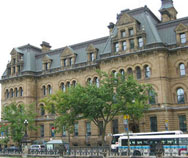 9. Somewhat similarly again, the Conservatives now have 22 seats in British Columbia, compared with a mere 9 for the New Democrats and 5 for the Liberals. But the Liberals took all of Vancouver Centre (where Hedy Fry held on against all of her challengers, including Michael Byers of the NDP), Vancouver Quadra, and Vancouver South. And the New Democrats have Vancouver East and Vancouver Kingsway.
9. Somewhat similarly again, the Conservatives now have 22 seats in British Columbia, compared with a mere 9 for the New Democrats and 5 for the Liberals. But the Liberals took all of Vancouver Centre (where Hedy Fry held on against all of her challengers, including Michael Byers of the NDP), Vancouver Quadra, and Vancouver South. And the New Democrats have Vancouver East and Vancouver Kingsway.
10. Premier Danny Williams successfully shut the Harper Conservatives out of Newfoundland and Labrador as well. Don’t tread on me Stephen Harper, etc. And then there’s Quebec, where Canada began (at the hands of the mysterious St. Lawrence Iroquoians, who invented the name “Kanata,” or so the story goes). One piece of good news here is that Justin Trudeau, husband of the fascinating Sophie Gregoire (and brother-in-law of the mysterious Zoe Bedos) has won for the Liberals in the nicely named Montreal riding of Papineau. And the Conservatives can at least take heart from the stunning triumph of Maxime Bernier, who took 62.4% of the vote in the Eastern Townships riding of Beauce, despite the much publicized hostility of his former girlfriend, the biker beauty Julie Couillard.
 11. Presumably, the good news for all the true north strong and free, from coast to coast to coast, is that with Stephen Harper suitably ensconced in the prime minister’s office in the Langevin Block once again, Western Canada really does have to stop complaining about its role in confederation. And if things in Ottawa screw up now, Alberta really will be the place to blame. Meanwhile, technically at least, it is still true that Mr. Harper still doesn’t have a majority government. (Though he has probably come close enough to feed his worst delusions – a fact for which, judging from his victory speech last night, he does seem suitably grateful to Jack Layton, and his version of the quasi-socialist New Democratic Party of Canada.) And if that’s not enough to make you happy in the challenging new era of today, check out Britney Spears’s hot new video, “Womanizer.” If she can come back like this, maybe the Liberals can too?
11. Presumably, the good news for all the true north strong and free, from coast to coast to coast, is that with Stephen Harper suitably ensconced in the prime minister’s office in the Langevin Block once again, Western Canada really does have to stop complaining about its role in confederation. And if things in Ottawa screw up now, Alberta really will be the place to blame. Meanwhile, technically at least, it is still true that Mr. Harper still doesn’t have a majority government. (Though he has probably come close enough to feed his worst delusions – a fact for which, judging from his victory speech last night, he does seem suitably grateful to Jack Layton, and his version of the quasi-socialist New Democratic Party of Canada.) And if that’s not enough to make you happy in the challenging new era of today, check out Britney Spears’s hot new video, “Womanizer.” If she can come back like this, maybe the Liberals can too?
|
|
2006 |
2008 |
||
|
|
% Popular Vote |
Seats |
% Popular Vote |
Seats |
|
Conservatives |
36.3 |
124 |
37.6 |
143 |
|
Liberals |
30.2 |
103 |
26.2 |
76 |
|
Bloc Quebecois |
10.5 |
51 |
10.0 |
50 |
|
New Democrats |
17.4 |
29 |
18.2 |
37 |
|
Green Party |
4.5 |
0 |
6.8 |
0 |
|
Independent |
0.6 |
1 |
0.6 |
2 |
SOURCES: Canadian federal election, 2006 ; Federal Election 2008.
(15) EARLIER REPORT FOR OCTOBER 13 …
 Canada will never be the same again? [UPDATED OCTOBER 14, WITH SEAT PREDICTIONS BELOW.] Almost all the smart money at this almost last minute says the Canadian people will elect another Conservative minority government in Ottawa on October 14, 2008 – in a House of Commons that looks much like it did after the last federal election, on January 23, 2006. Yet it’s hard not to bump up against the thought that this will nonetheless prove a landmark election in Canadian political history, whether we care or not.
Canada will never be the same again? [UPDATED OCTOBER 14, WITH SEAT PREDICTIONS BELOW.] Almost all the smart money at this almost last minute says the Canadian people will elect another Conservative minority government in Ottawa on October 14, 2008 – in a House of Commons that looks much like it did after the last federal election, on January 23, 2006. Yet it’s hard not to bump up against the thought that this will nonetheless prove a landmark election in Canadian political history, whether we care or not.
Until the results are in, it is impossible to say exactly why. There is still some possibility that the Conservatives will win a bare majority of seats (with not much more than a third of the popular vote?) Or perhaps even that the 17% of voters who are still undecided will finally surge towards some Liberal minority. Meanwhile, the new keys to the kingdom have just been revealed by Silver Donald Cameron, in the Halifax Chronicle-Herald: “Canada is a centre-left country which is now being steered by a right-wing minority. That’s an unstable situation … In terms of seats, the next Parliament may well look like the last one. Beneath the surface, though, strong currents are running. Politically, this election looks like a water-shed – the true end of the last century, and the real beginning of the new one.”
 The new left in Canada today (or the end of the Liberals as the natural governing party)? If the Liberals do by some statistical fluke wind up with the largest number of seats in the Canadian House of Commons tomorrow, even most Liberals will be surprised.
The new left in Canada today (or the end of the Liberals as the natural governing party)? If the Liberals do by some statistical fluke wind up with the largest number of seats in the Canadian House of Commons tomorrow, even most Liberals will be surprised.
Stephane Dion is travelling straight across the country, from Fredericton, New Brunswick to Montreal to Winnipeg to Vancouver, BC – “to send the message that, if we pull together, if we bring our vote together, everything is possible.” But the prospect of “a progressive government, a Liberal government, for all Canadians” being touted in the dying hours of this short and somewhat strange campaign by “an upbeat, cheerful Dion” still seems the least likely of all the conceivable possibilities.
(The other two are the most likely Conservative minority and the second least likely Conservative majority – all playing by the final polling numbers, which may be less reliable this time than usual, for a host of tedious reasons.)
But even if the Liberals do somehow win a precarious minority government, the point in this campaign, a week or so ago, when the New Democrats came almost even with Liberals in certain polling numbers will still be ringing in the air. What briefly looked like a potential utter collapse of the party in British Columbia will remain at the back of many minds. The dramatic decline of the old natural governing party of Canada in Quebec, that has been going on for some time now, may have abated somewhat, thanks to Conservative mistakes. But then there is Green Party leader Elizabeth May’s strong showing in this campaign’s English-language debate.
To have any legs, as well, any Liberal minority government will have to turn into an effective coalition government with the New Democrats. (Assuming the Greens may well increase their popular vote, but will still not win any actual seats in the House. Here the big story would be Ms. May’s triumph over Conservative cabinet minister Peter McKay in the Nova Scotia riding of Central Nova. But again the smart money is saying this is not too likely.)
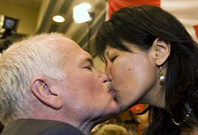 Listening to NDP leader Jack Layton (and Stephane Dion) talk over the past several weeks, you might think that such a left-wing progressive Liberal-NDP coalition is practically next to impossible. But politics does make strange bedfellows. And as such current Liberal big guns (and former New Democrats) as Bob Rae and Ujjal Dosanjh make clear enough, the Liberals and New Democrats are not as unaccustomed to sleeping together as they sometimes pretend.
Listening to NDP leader Jack Layton (and Stephane Dion) talk over the past several weeks, you might think that such a left-wing progressive Liberal-NDP coalition is practically next to impossible. But politics does make strange bedfellows. And as such current Liberal big guns (and former New Democrats) as Bob Rae and Ujjal Dosanjh make clear enough, the Liberals and New Democrats are not as unaccustomed to sleeping together as they sometimes pretend.
In any case, even if the Liberals do not win a minority government immediately, Roy MacGregor in today’s Globe and Mail has elaborated on some of the themes suggested by Silver Donald Cameron: “Now, if Stephen Harper falls short of what should have been an effortless majority,” certain opposition politicians “see opportunity, and the reasoning goes like this: Canadians have no appetite for another $300-million-plus election that would solve nothing ….
“As Jeffrey Simpson wrote the other day in this newspaper, the old days of one or the other strong party running things is over “perhaps forever.” So fractured has voting become that minorities are more the rule than the exception …
“NDP Leader Jack Layton said back on Sept. 22 that he would entertain the notion of entering into a coalition with the Liberals’ if that were required to get the Conservatives out of power.’
“And if Liberals plus NDP is not enough, some senior Liberals are now whispering favourably of the surging Bloc Qubcois … And Leader Gilles Duceppe, beneficiary of a surprisingly botched Conservative campaign, would not likely care for another election soon, either …
“As for the key decision maker, the Governor-General, she would be acutely aware of how unpopular another election would be and would be open to a committed coalition taking over, if a Harper minority government were to fall.”
Of course none of this may ever actually happen. But when even the mainstream media starts talking like this, even just hypothetically, you know something is blowing in the wind.
The bottom line is just that the left or progressive side of the traditional political spectrum in Canada is now more decisively fragmented than it has been perhaps ever (or at least since the early 1920s or 1970s)? If there is going to be anything other than a right-wing government in the foreseeable Canadian future, it probably is going to have to be some kind of coalition government, of a sort we really haven’t had much experience with in Canada so far. No one, e.g., is imagining that Stephane Dion’s Liberals have any chance of forming a majority government on October 14. And there seems very little to suggest at the moment, in any case, that this prospect will change (even under new leadership) in a yet another election held a few years hence.
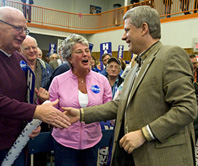 Has Stephen Harper destroyed the Red Tory tradition forever? If Stephen Harper does somehow manage to win a majority government tomorrow, in spite of what all the polls seem to be saying, the problem for Canadian political culture is somewhat different. For the next four years at any rate (assuming the fixed election date legislation is finally activated in practice) there would be a stable government in Ottawa. But its stability would be strictly technical.
Has Stephen Harper destroyed the Red Tory tradition forever? If Stephen Harper does somehow manage to win a majority government tomorrow, in spite of what all the polls seem to be saying, the problem for Canadian political culture is somewhat different. For the next four years at any rate (assuming the fixed election date legislation is finally activated in practice) there would be a stable government in Ottawa. But its stability would be strictly technical.
Here, that is to say, Silver Donald Cameron’s wisdom comes most directly into play: “Canada is a centre-left country which is now being steered by a right-wing minority. That’s an unstable situation.” Legally and constitutionally, Mr. Harper with a majority of seats in Parliament (won with little more than a third of the popular vote?) would be able to visit the worst of his right-wing nightmares on an electoral majority that just wants to sleep quietly.
A few parts of the country will be happy. But the rest will be seething with a resentment that would condemn Mr. Harper and his party to four years of misery, in spite of their technical majority (and especially perhaps in an unusually challenging international economy, with a President Barack Obama in the neighbouring United States).
 On the other hand, Mr. Harper himself has rather foolishly recently said on TV that if he does win merely another minority government tomorrow, the voters will have in effect warned the opposition parties that they want his government to be able to govern, without precipitating another election right away. This is the kind of Orwellian doublespeak that still makes many voters reluctant to give Mr. Harper a majority government.
On the other hand, Mr. Harper himself has rather foolishly recently said on TV that if he does win merely another minority government tomorrow, the voters will have in effect warned the opposition parties that they want his government to be able to govern, without precipitating another election right away. This is the kind of Orwellian doublespeak that still makes many voters reluctant to give Mr. Harper a majority government.
As before, even if he has only a minority government, Mr. Harper apparently intends to govern as if he had a majority – and the democratic sovereign majority in the elected Canadian House of Commons can kiss his derriere (or get blamed by the voters for precipitating yet another Canadian federal election too soon, by defeating his minority government).
Roy MacGregor’s (and many others’) opposition coalition government scenario is presumably intended to discipline such wayward thoughts on Mr. Harper’s part. In the new 40th Parliament which will mark the real beginning of the 21st century in Canadian politics, the option to another election right away if a Conservative minority government is defeated will be an opposition coalition government, that assumes power through the good offices of Governor General Jean, without another election. (Or so the emerging theory seems to go.)
Mr. Harper has already on TV “suggested the other parties might ask the governor general for permission to form a coalition government if they win enough seats – a move he said would be disastrous’ for Canada.” This sounds as if he is thinking that even if he does win the most seats, though far from a majority, the opposition parties will try to form a coalition right away. But, as Roy MacGregor’s account implies, the more likely scenario here is that the Governor General would let Mr. Harper form a minority government if he has the largest number of seats. But if this government then tries to force legislation on the House that the majority of MPs do not agree with, it would be defeated, and then replaced by an opposition coalition, more attuned to the wishes of the majority in the House – which is how a parliamentary democracy is supposed to work. (Read, e.g., Walter Bagehot’s classic book on The English Constitution: one key role of the House of Commons is to elect a prime minister who will carry out the House’s wishes.)
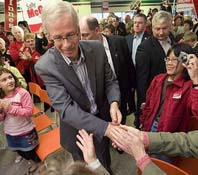 In the past other Conservative governments in Canada – minority and majority – have dealt with the problems both Mr. Cameron and Mr. MacGregor allude to by moving closer to the centre of the political spectrum to attract majority support. All this is part of the logic behind the fabled “Red Tory” tradition in a “centre-left” Canada. (Or as the historian Frank Underhill once put it, “Canadians always vote Democratic in American elections,” etc.)
In the past other Conservative governments in Canada – minority and majority – have dealt with the problems both Mr. Cameron and Mr. MacGregor allude to by moving closer to the centre of the political spectrum to attract majority support. All this is part of the logic behind the fabled “Red Tory” tradition in a “centre-left” Canada. (Or as the historian Frank Underhill once put it, “Canadians always vote Democratic in American elections,” etc.)
Mr. Harper’s main problem here sometimes seems to be that although he is willing to try to appeal to Canadians outside the Conservative camp, narrowly defined, and has even talked about how important it is to do this, he still does have a kind of ideological objection to any kind of Red Toryism. The Conservative Party of Canada under his watch has abandoned the old “progressive conservative” heresy, along with the Progressive Conservative name.
(To say nothing of the old “Liberal Conservative” brand of John A. Macdonald and Georges Etienne Cartier, who did so much to found the confederation of 1867 in the first place).
At last something sensible: some seat predictions. OCTOBER 14, 1 AM. I was going to end these all-too-long pre-election notes with some allegedly deep reflections on “The global financial crisis, the US election, and Canadian politics.” But with the opening of the only polls that finally count so close, a look at some predictions of just how many of the 308 elected seats in the 40th Parliament of Canada each party will win seems more interesting, and immediately to the point:
|
Source |
Con |
Lib |
BQ |
NDP |
Grn |
Ind |
|
136 |
84 |
51 |
35 |
0 |
2 |
|
|
132 |
90 |
51 |
33 |
0 |
2 |
|
|
131 |
89 |
47 |
39 |
0 |
2 |
|
|
125 |
94 |
51 |
36 |
0 |
2 |
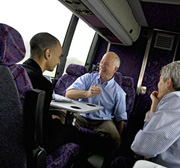 What would I predict myself? I think the interested electorate is just too volatile to make any altogether sensible guess – beyond the broadly similar forecasts above. There is some prospect, I think, that in Ontario and perhaps even Quebec and possibly to a lesser extent BC (and perhaps certainly Atlantic Canada too), disproportionate numbers of undecided voters will finally swing to the Liberals, although it does also seem that this prospect is weaker this time than in 2006. In any case, my guess would be closer to the bottom than the top of the four predictions above. Personally, I’d be delighted to see the Liberals do even better than the Election Prediction Project suggests, and I don’t think this is altogether out of the question. But this would defy virtually all the pre-election polling data extant. And nowadays this data is seldom quite that wrong. (Which is not to say that such things can never happen: democratic politics is mercifully not an exact science. But, as already alluded to, even most Liberals will be surprised if they do all that much better than any of the predictions above.)
What would I predict myself? I think the interested electorate is just too volatile to make any altogether sensible guess – beyond the broadly similar forecasts above. There is some prospect, I think, that in Ontario and perhaps even Quebec and possibly to a lesser extent BC (and perhaps certainly Atlantic Canada too), disproportionate numbers of undecided voters will finally swing to the Liberals, although it does also seem that this prospect is weaker this time than in 2006. In any case, my guess would be closer to the bottom than the top of the four predictions above. Personally, I’d be delighted to see the Liberals do even better than the Election Prediction Project suggests, and I don’t think this is altogether out of the question. But this would defy virtually all the pre-election polling data extant. And nowadays this data is seldom quite that wrong. (Which is not to say that such things can never happen: democratic politics is mercifully not an exact science. But, as already alluded to, even most Liberals will be surprised if they do all that much better than any of the predictions above.)
As far as the question of an opposition coalition discussed earlier goes, only the last prediction above gives the Liberals and New Democrats combined more seats than the Conservatives – and the difference is far from vast (130 vs. 125). On any of these four scenarios, a majority opposition coalition would have to include the support of the Bloc Quebecois (BQ).
So … for those of us who are congenitally interested in Canadian politics, come what may -Â perhaps as a result of some childhood disease that lingers on, it should be an interesting election night that lies immediately ahead. Even if the ultimate outcome across the country does not appear all that mysterious. Whatever happens exactly, it still seems to me that Silver Donald Cameron has hit some kind of nail on the head: “Beneath the surface … strong currents are running …. this election looks like a water-shed – the true end of the last century, and the real beginning of the new one.”
(14) EARLIER REPORT FOR OCTOBER 11 …
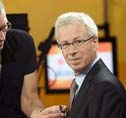 La grosse machine librale se reveille? For anyone who is not a confirmed Conservative (or New Democrat?), about the only exciting prospect for the October 14 Canadian federal election, now almost upon us, is the still very slight possibility that, somehow – beyond all reason and sensible hope – Stephane Dion and his Liberal team are going to surge ahead at the last moment, and win a precarious minority government.
La grosse machine librale se reveille? For anyone who is not a confirmed Conservative (or New Democrat?), about the only exciting prospect for the October 14 Canadian federal election, now almost upon us, is the still very slight possibility that, somehow – beyond all reason and sensible hope – Stephane Dion and his Liberal team are going to surge ahead at the last moment, and win a precarious minority government.
The much more likely possibility, virtually all the polls are still saying, is that Stephen Harper’s Conservatives are going to win a perhaps equally precarious minority government. And the very big and most seriously interesting question still is: Can Mr. Harper confound most polls and actually win at least a bare majority of seats in Parliament, as his very divided opposition cancels itself out in some crucial battleground ridings – where the Conservatives are just strong enough to finish first in local races among four highly competitive parties? You have to be both a raving political junkie and a mathematician to find this kind of question interesting, of course, which no doubt helps explain why many Canadians still seem bored at best by this election.
The shaky economic base. Even in Canada, the economic background is certainly exciting – or much worse. Consider the headlines: “Loonie takes steepest one-day dive ever” ; “TSX closes 535 points down … Toronto exchange hits lowest level since December 2004″ ; “20 questions on the market meltdown” ; “Market panic spreads as freefall grips Europe, Asia” ; “Analysts abandon forecasting … ‘We don’t have a clue, and we’re not going to pretend that we do.'”
The one brief bright spot at the moment in Canada is: “September employment unexpectedly soars,” or “September employment soars unexpectedly.” Or, as explained by the official Statistics Canada Labour Force Survey for September 2008: “Following a decline in July and a small gain in August, employment increased by 107,000 in September. Almost all of this increase was in part-time work (+97,000). Despite the gain, the unemployment rate was unchanged at 6.1%, as the increase in employment was matched by a similar rise in labour force participation.”
Stephane Dion’s straws in the wind. Chantal Hebert is suggesting “Quebec numbers suggest Conservative debacle,” and this seems to be where the Liberals’ last fond hopes begin.
As reported in Le Devoir: “Le chef libral plus confiant que jamais … C’est un jour significatif parce que je sens que le Parti libral du Canada, qui a t tout au long de notre histoire le parti prfr des Qubcois, a une chance de redevenir le parti prfr des Qubcois, a affirm Stphane Dion. [C’est] la renaissance d’un grand parti que les Qubcois et les autres Canadiens ont envoy dans l’opposition pour qu’il se renouvelle et nous sommes prs maintenant.”
Beyond Quebec some will say Stephane Dion hurt his hopes for some wild last burst into the limelight when he blew an important English-language interview at CTV. On the other hand, consider: “Dion hits back in botched interview flap” ; “Duceppe defends Dion in botched interview flap” ; and “Dion criticizes Harper, CTV over interview.”
At somewhat greater length: “Prime Minister Stephen Harper is pointing to a bungled English-language interview by Stephane Dion as proof that the Liberal leader doesn’t have what it takes to cope with the current financial crisis … The Liberals retort that Harper is taking a cheap shot at a man whose English is imperfect, and who has a hearing disability to boot.”
New Cadman tape revelations. Whether some fresh revelations about Conservative hanky-panky regarding the late great Chuck Cadman will help the Liberals seems anyone’s guess. In any case, here is a quick review:
“Tape not altered as Harper claims, analysis finds … Harper sued the Liberals in the midst of a raging controversy earlier this year over claims in a book by BC author Tom Zytaruk that Conservatives offered late MP Chuck Cadman a $1-million life insurance policy in return for help defeating the minority Liberal government in 2005 … The Prime Minister claims Zytaruk doctored the tape of an interview he conducted with Harper after Cadman died, and denies he told Zytaruk he was unaware of the “details” of the insurance policy offer … Harper insists he only confirmed the party had offered Cadman “financial considerations” in return for rejoining the Tories and voting against the Liberals in a Commons confidence vote … But former FBI agent Bruce Koenig, the sound expert Harper hired to prove his allegations, submitted a report dated Friday to Harper’s lawyer, which also had to be sent to the Liberal lawyer, Chris Paliare, saying the contentious portion of the interview was uninterrupted.”
What about some Liberal-NDP Accord in Ottawa? If Stephane Dion does somehow manage to win a precarious minority government, he will still need partners to pass legislation in the House. And what about if the Conservatives have the largest number of seats, but still far short of a majority, while the Liberals and New Democrats combined do have a majority?
Some recent speculation on this subject from Atlantic Canada is interesting: “Dion rules out coalition with NDP as race tightens … ‘I can’t govern with somebody who wants to raise taxes by $50b’ … Stephane Dion said Thursday that he would not form a coalition with the NDP to stop Stephen Harper from becoming prime minister – even if the two parties have more seats than the Tories – because NDP Leader Jack Layton wants to raise corporate taxes … But Mr. Dion might well have to reconsider after the election, says Independent MP Bill Casey, who says voters are talking about the possibility … “I think there will be pressure for them to do it,” he said. “I hear it every day now” … And Cape Breton Liberal MP Rodger Cuzner says he thinks Mr. Dion would likely have to do it, if only for the sake of the environment … “For the good of the planet, I think that Dion would go there in his thinking,” he said, adding, “I don’t want to speak for him, and it’s hypothetical” … Sackville-Eastern Shore NDP MP Peter Stoffer says he won’t rule out the prospect … “The reality is, that is simply not out of the question,” he said.
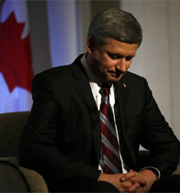 Almost all the latest numbers are still saying Conservative minority. Consider, first: “Tories still lead in BC, new poll finds … Stephane Dion’s Liberals ‘no longer look in danger of being wiped out’ … Federal Conservatives continue to lead in British Columbia, but Liberal support has rebounded enough for the party to retain some of its nine seats, according to a new poll commissioned for Canwest News Service … The public opinion survey, by Ipsos Reid, said 39 per cent of voters supported the Tories, compared to the New Democrats at 25 per cent, the Liberals at 24 per cent and the Greens at 11 per cent.
Almost all the latest numbers are still saying Conservative minority. Consider, first: “Tories still lead in BC, new poll finds … Stephane Dion’s Liberals ‘no longer look in danger of being wiped out’ … Federal Conservatives continue to lead in British Columbia, but Liberal support has rebounded enough for the party to retain some of its nine seats, according to a new poll commissioned for Canwest News Service … The public opinion survey, by Ipsos Reid, said 39 per cent of voters supported the Tories, compared to the New Democrats at 25 per cent, the Liberals at 24 per cent and the Greens at 11 per cent.
And then, meanwhile, back in bad old Central Canada: “The latest Canadian Press Harris-Decima poll had Tory support at 34 per cent nationally, followed by the Liberals at 26 per cent and NDP fortunes fading at 18 per cent … In Ontario, the Liberals had 33 per cent, the Conservatives 31 per cent and the NDP off its recent highs at 21 per cent.”
A largely contented country? The Economist in the UK, which still pays some attention to the old first self-governing dominion of the British empire, has most recently spun the story of how the international financial panic of 2008, so to speak, has spoiled Stephen Harper’s earlier successful-looking plans to win a majority government in Canada.
The last paragraph of its story reads: “Still, it is outside events, more than his own mistakes, that have sent Mr Harper’s plans awry over the campaign’s first four weeks. Unless matters change dramatically in its final four days, it seemed as if the make-up of the new House of Commons might look remarkably like that of the outgoing one, though the NDP and the Greens may pick up a few seats at the expense of the Liberals. That would look like a defeat for Mr Harper. But it would be an accurate reflection of the curious political stasis of a largely contented country.”
The idea that Canada today is “a largely contented country” may seem odd to many of us who live here most of the time.
On the other hand, if Stephen Harper does not somehow win a majority government on October 14, 2008, we will continue to be in the midst of what The Economist quite nicely calls the “curious political stasis” of the past several years. And then we – or at least those among us who continue to take our democratic politics more or less seriously – may have to start thinking a bit more seriously about what ought to be done about it. (Unless the best explanation of course is that we really are “a largely contented country.” But that seems unlikely.)
(13) EARLIER REPORT FOR OCTOBER 7 …
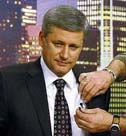 Good old-fashioned financial panic will at least stop a Harper majority (and maybe do even worse)? [UPDATED OCTOBER 8].”Up to the early 20th century,” an early 21 st century website tells us, “economic setbacks were known as financial panics’.” And these economic events typically had their own political fallout. The Financial Panic of 1837 (with origins in the United States), e.g., ultimately led to the Rebellions of 183738 in the old Provinces of Upper and Lower Canada. The Financial Panic of 1873 helped precipitate the Pacific Scandal and the defeat of John A. Macdonald’s and Georges Etienne Cartier’s first government of the new Dominion of Canada, from sea to sea.
Good old-fashioned financial panic will at least stop a Harper majority (and maybe do even worse)? [UPDATED OCTOBER 8].”Up to the early 20th century,” an early 21 st century website tells us, “economic setbacks were known as financial panics’.” And these economic events typically had their own political fallout. The Financial Panic of 1837 (with origins in the United States), e.g., ultimately led to the Rebellions of 183738 in the old Provinces of Upper and Lower Canada. The Financial Panic of 1873 helped precipitate the Pacific Scandal and the defeat of John A. Macdonald’s and Georges Etienne Cartier’s first government of the new Dominion of Canada, from sea to sea.
Much more recently, we have spent the last few decades of the 20th century reviving the political and economic theories of the 19th century. So it is not too surprising that we are suddenly in the midst of the “Financial Panic of 2008.” And as MSNBC is explaining at the moment “US financial panic goes global.” So Stephen Harper, who whatever else is a clever fellow with an MA in economics, may have anticipated all this. The theory behind the October 14 election he broke his fixed-date election legislation to call may even have been to win a majority government before the panic set in. The latest polls, however, say he is still going to be prime minister – but only with another minority government. (And maybe an even more slender one, with a weaker mandate, than what he has now. Or, at least some reports now suggest, Mr. Harper might even lose his job as prime minister? Or, then again, probably not!)
Of course, the polls one week before the actual election day could be wrong. Prime Minister Harper finally introduced his Conservative platform in Toronto today, because “Tory platform suddenly needed to stop party’s slide in support.” The slide in support has been especially prominent in Ontario and Quebec, where the Financial Panic of 2008 is bringing fresh doom and gloom to the already beleaguered Central Canadian manufacturing sector. So in his party platform “Harper promises loans for manufacturers” – something that used to be dismissed by his finance minister Jim Flaherty (also a former Ontario finance minister in what many provincial voters nowadays see as the dark days of Mike “the Knife” Harris’s Common Sense Revolution).
On the other hand, Mr. Harper does not seem to be paying much serious attention to his new troubles in the old Lower Canada (to take just one headline, e.g., from Le Devoir: “Rforme du Snat et demandes du Qubec – Charest essuie deux rebuffades de Harper“). And even back on Mr. Harper’s current home ground, it is not just manufacturing that is taking hits. As a Calgary Herald headline screams today: “Staggering markets fuel investor panic … Oil’s plunge could cost Alberta $2B.” (And there are even those who say that the Conservative federal monopoly in the Rose Province could be at risk in at least one riding: the formidable environmentalist New Democrat Linda Duncan just might be poised to take Rahim Jaffer’s seat in Edmonton.)
Similarly, Mr. Harper at the Toronto press conference where he introduced his party platform did seem vaguely reminiscent of Herbert Hoover in 1929. Among other things, the exercise was meant to reassure voters that he was concerned about the Financial Panic of 2008, and did have some plans for dealing with its fallout for ordinary working Canadians, from coast to coast to coast. But it is clear enough that his underlying faith in all these matters is just a somewhat more moderate and sanitized version of the old aggressive right-wing free-market arguments advanced just a few days ago by one Nicholas Provenzo, “founder and Chairman of the Center for the Advancement of Capitalism,” in an article entitled “The Financial Panic of 2008: Government Controls are the Cause, Laissez-Faire Capitalism is the Solution” (on a website known as Capitalism Magazine). Or, as Barack Obama might say, Stephen Harper, like John McCain, wants to cure our current social and economic ailments using the same policies and political theories that have created them in the first place!
Meanwhile, a quick synopsis of press reports on the latest polls, in chronological order (and with some repetition and/or overlap) would run more or less like this:
* “A new poll suggests the federal election race is tightening as party leaders head into the home stretch … With just over a week until voting day, a new survey suggests Prime Minister Stephen Harper’s Conservatives have dipped to 34 per cent in support still 10 points ahead of the Liberals but short of levels needed to win a majority … The Canadian Press Harris-Decima survey put NDP support at 20 per cent and the Greens at 13 per cent, while the Bloc Quebecois had eight per cent nationally and was leading in Quebec with 33 per cent … Harris-Decima president Bruce Anderson says the latest results suggest Tory hopes for a majority are dimmer than at any time since the campaign began a month ago.”
* “A Decima/Harris poll published Monday for The Canadian Press showed the Conservatives with the support of 32 per cent of decided voters nationally, followed by the Liberals at 25 per cent, the NDP at 21 per cent, the Greens at 12 per cent and the Bloc Qubcois at 8 per cent. The poll’s margin of error was 2.7 per cent … Monday’s Nanos Research poll placed the Conservatives at 34 per cent, with the Liberals snapping at 29 per cent, the NDP at 20 per cent, the Bloc at 11 per cent and the Greens at 6 per cent. The poll’s margin of error was 3.1 per cent … And a Strategic Counsel survey of the 45 closest races in Quebec, Ontario and British Columbia showed the Conservatives now doing worse in Quebec than they did in the 2006 election and the downturn in support for the party spreading across the Ottawa River into Ontario.”
* “An Ekos survey released on Monday night, covering Saturday through Monday, put the Conservatives ahead of the Liberals by 33 percent to 26 percent, with the leftist New Democratic Party (NDP) at 19 percent … A Harris-Decima/Canadian Press poll put the Conservatives at 32 percent – down 2 points from the day before, down 5 points in the space of three days and 4 points less than what they got in the 2006 election. The poll had the Liberals at 25 percent and the NDP at 21 percent … Harris-Decima pollster Bruce Anderson said jitters about the economy were cutting into support for Conservative Prime Minister Stephen Harper, who has advocated a steady hand with no dramatic moves …A third survey, by Nanos, had the Conservatives at 34 percent, the Liberals at 29 percent and the NDP at 20 … It is possible to get a majority of seats with about 40 percent of the vote or, if there is a large gap over the nearest rival, with somewhere around 37 or 38 percent … But that large gap has disappeared, now making another minority government the most likely outcome.”
* “A new poll suggests Conservative support is still slipping with just a week to go before the Oct. 14 election … The latest Canadian Press Harris-Decima survey puts the Tories at 31 per cent, 10 points off the high they touched in the first week of the campaign … They remain ahead of the Liberals, who are up a point to 26 per cent … The NDP was steady at 21 per cent and the Greens up a point to 13 per cent, while the Bloc Qubcois remained at 8 per cent nationally, with 33 per cent in Quebec … In Ontario, the poll suggests a dramatic swing, with the Liberals regaining the lead at 34 per cent and the Conservatives falling to 26 per cent, just in front of the NDP at 24. The Greens have 15 per cent.”
* On the very worst-case scenario, the Conservatives might even wind up with less seats in Parliament than Stephane Dion’s Liberals (although don’t bet the farm on this prospect quite yet).
* UPDATE OCTOBER 8: This just in. Yet another new poll shows Conservative support starting to strengthen again – enough for another minority government at least.
(12) EARLIER REPORT FOR OCTOBER 3 …
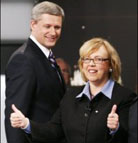 Prime Minister Harper and President Obama? [UPDATED OCTOBER 4]. So … Liberal leader Stephane Dion “went a fair distance” in the October 2 English language debate in the Canadian election campaign that you hardly hear about in the wider global village – “speaking passable English and landing several punches on Stephen Harper.” An office colleague even reports that his 20-something daughters found M. Dion unexpectedly “cute.” Alas, however, at least the initial consensus seems to be that Conservative Stephen Harper and/or Elizabeth May of the freshly percolating Green Party won the debate. And, to make matters worse, New Democrat Jack Layton actually finished a bit ahead of M. Dion. The French language debate on October 1 was different. There: “Instant poll finds Dion clear debate winner.” And this may have helped rob Mr. Harper of a majority government on October 14. But, barring some very big surprise, there seems little doubt that the next prime minister of Canada will be the same somewhat chubby, Pepsi-drinking lapsed (?) neo-con ideologue from the oil town of Calgary, Alberta who occupies the office now. Meanwhile, in the US vice-presidential debate, also on October 2: “Palin talks straight but still stumbles; Biden fights back – and sheds a tear” (as reported by John Ibbitson of the Globe and Mail.) And/or, according to David Brooks in the New York Times: “Palin took her inexperience and made a mansion out of it.” Nonetheless: “The race has not been transformed.”
Prime Minister Harper and President Obama? [UPDATED OCTOBER 4]. So … Liberal leader Stephane Dion “went a fair distance” in the October 2 English language debate in the Canadian election campaign that you hardly hear about in the wider global village – “speaking passable English and landing several punches on Stephen Harper.” An office colleague even reports that his 20-something daughters found M. Dion unexpectedly “cute.” Alas, however, at least the initial consensus seems to be that Conservative Stephen Harper and/or Elizabeth May of the freshly percolating Green Party won the debate. And, to make matters worse, New Democrat Jack Layton actually finished a bit ahead of M. Dion. The French language debate on October 1 was different. There: “Instant poll finds Dion clear debate winner.” And this may have helped rob Mr. Harper of a majority government on October 14. But, barring some very big surprise, there seems little doubt that the next prime minister of Canada will be the same somewhat chubby, Pepsi-drinking lapsed (?) neo-con ideologue from the oil town of Calgary, Alberta who occupies the office now. Meanwhile, in the US vice-presidential debate, also on October 2: “Palin talks straight but still stumbles; Biden fights back – and sheds a tear” (as reported by John Ibbitson of the Globe and Mail.) And/or, according to David Brooks in the New York Times: “Palin took her inexperience and made a mansion out of it.” Nonetheless: “The race has not been transformed.”
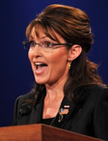 Put another way, it now seems as well that Barack Obama has, on most readings, a growing lead over John McCain. It may be that the big US economic shock clarified by the $700 billion “bailout bill” whose second version finally became law today has effectively made Senator McCain’s case extremely difficult, regardless of what Governor Palin does. For whatever reason, at the moment only one of the 13 national polls tracked by the USA Election Polls website does not give Senator Obama the nod in current electoral college projections. On US TV this Friday night, October 3, there was much talk about how this trend seemed to be starting to gel, with only a month left until voting day on November 4.
Put another way, it now seems as well that Barack Obama has, on most readings, a growing lead over John McCain. It may be that the big US economic shock clarified by the $700 billion “bailout bill” whose second version finally became law today has effectively made Senator McCain’s case extremely difficult, regardless of what Governor Palin does. For whatever reason, at the moment only one of the 13 national polls tracked by the USA Election Polls website does not give Senator Obama the nod in current electoral college projections. On US TV this Friday night, October 3, there was much talk about how this trend seemed to be starting to gel, with only a month left until voting day on November 4.
No doubt the Obama campaign is taking nothing for granted, and it will be hard to altogether believe in President Obama until he actually wins on election day, if that is what finally happens. But if, with only a month to go, Obama’s lead is said to be gelling, or hardening, how much more compelling is the Canadian case for Stephen Harper with only 11 days until the actual vote? It is true that the latest Nanos poll on Andrew Heard’s Election Opinion Polls site puts the Conservatives at only 35%, with the Liberals not all that far behind at 30%. But you have to go all the way back to late August in these records to find the Liberals somewhat ahead of the Conservatives. And Mr. Heard’s tracking does not include those more recent polls where the Liberals and the New Democrats are very close.
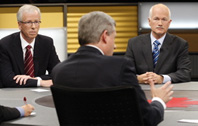 It is equally true that the most recent polls in Mr. Heard’s tracking do not suggest as much as a Conservative majority government. You have to go back to mid to early September to find polls putting the Conservatives at 40% or more of the popular vote – the level of support customarily viewed as required to win a majority of seats in Parliament, given Canada’s current somewhat unusual multi-party system (with five more or less serious parties now in the race) and our “first-past-the-post” electoral institutions.
It is equally true that the most recent polls in Mr. Heard’s tracking do not suggest as much as a Conservative majority government. You have to go back to mid to early September to find polls putting the Conservatives at 40% or more of the popular vote – the level of support customarily viewed as required to win a majority of seats in Parliament, given Canada’s current somewhat unusual multi-party system (with five more or less serious parties now in the race) and our “first-past-the-post” electoral institutions.
It may be, however, that economic fears in Canada, spilling over from the United States, will work to the Conservative advantage – as they did in the first half of the 1930s with R.B. Bennett (also from Calgary, intriguingly enough: and see report 9 below). Just in case this does remain a more or less serious prospect on October 14, 2008, the October 3 Globe and Mail has an interesting article by Steven Chase, headlined: “A Harper majority would tread lightly … Seeking to shift Canada rightward, Tory Leader plans to forgo radical change – but that doesn’t mean he’s aiming to please everyone.”
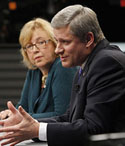 Mr. Chase makes a few points that may or may not prove worth remembering later on, but do seem intriguing right now in any case: “What kind of majority government leader would Stephen Harper be? Conservatives familiar with his thinking reach back through the decades to describe a more centre-right version of the pragmatic Mackenzie King than a bold and brash Ronald Reagan or Margaret Thatcher. … But should Mr. Harper get his majority on Oct. 14, Tories say that incremental conservatism won’t stand in the way of his plans to usher in an elected Senate with eight-year terms … while Mr. Harper seeks to appeal to more Canadians … he’s not trying to please everyone. This means that he’ll only tack to the centre so much and will continue to offer measures that please his rock-ribbed Conservative base, such as cutting a legal aid program for constitutional challenges … Conservatives figure that their base of support is around 30 per cent of the electorate, with an additional group of voters that leans Tory. They want to grow that base and solidify Tory-leaning swing voters to have a coalition capable of winning the 40 per cent of the vote traditionally necessary to form a majority government.” Finally: “Notwithstanding his commitment to moderate change,” Mr. Harper has already “managed drastic change in one area since taking office 32 months ago. In the name of shrinking government, the Tories have significantly drained Ottawa’s capacity to launch ambitious new spending … The Tories shovelled out tax breaks that by 2012-13 when fully enacted will cost Ottawa $40-billion in forgone annual revenue …That’s in addition to billions of extra equalization dollars the Tories shifted to the provinces in the 007 budget.”
Mr. Chase makes a few points that may or may not prove worth remembering later on, but do seem intriguing right now in any case: “What kind of majority government leader would Stephen Harper be? Conservatives familiar with his thinking reach back through the decades to describe a more centre-right version of the pragmatic Mackenzie King than a bold and brash Ronald Reagan or Margaret Thatcher. … But should Mr. Harper get his majority on Oct. 14, Tories say that incremental conservatism won’t stand in the way of his plans to usher in an elected Senate with eight-year terms … while Mr. Harper seeks to appeal to more Canadians … he’s not trying to please everyone. This means that he’ll only tack to the centre so much and will continue to offer measures that please his rock-ribbed Conservative base, such as cutting a legal aid program for constitutional challenges … Conservatives figure that their base of support is around 30 per cent of the electorate, with an additional group of voters that leans Tory. They want to grow that base and solidify Tory-leaning swing voters to have a coalition capable of winning the 40 per cent of the vote traditionally necessary to form a majority government.” Finally: “Notwithstanding his commitment to moderate change,” Mr. Harper has already “managed drastic change in one area since taking office 32 months ago. In the name of shrinking government, the Tories have significantly drained Ottawa’s capacity to launch ambitious new spending … The Tories shovelled out tax breaks that by 2012-13 when fully enacted will cost Ottawa $40-billion in forgone annual revenue …That’s in addition to billions of extra equalization dollars the Tories shifted to the provinces in the 007 budget.”
UPDATE OCTOBER 4: A new Toronto Star/Angus Reid survey out today shows the Conservatives at 40%, Liberals 25%, NDP 19% and Green Party 6%. The Toronto Star’s Federal Poll Tracker also shows the Conservatives at 40% later in September than Andrew Heard’s tracking. The latest Canadian Press/Harris-Decima survey, on the other hand, suggests “Tory majority slipping away … NDP gaining ground.”
So there still does seem some room in the polling data for surprises of some sort. It certainly remains far from clear exactly what the result will be on October 14. And if there is nothing in the data right now to suggest that a Liberal (or NDP) minority government is possible, there still does appear to be some hope for a Tory majority in Parliament. (And then again there is Elizabeth May’s “suggestion the opposition parties in a minority parliament could ask the Governor General to let them form a coalition government.”)
(11) EARLIER REPORT FOR OCTOBER 1 …
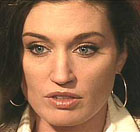 Waiting for the French debate. Two news items from this morning could make you think that the Canadian leaders debate in French tonight might be a little more interesting than most of the campaign so far. (Though abstain from big bets on this is no doubt still the best advice. UPDATE OCTOBER 2: In fact things were interesting enough: see “Harper gets gang tackled in French debate.” And now don’t forget to watch the English debate tonight!)
Waiting for the French debate. Two news items from this morning could make you think that the Canadian leaders debate in French tonight might be a little more interesting than most of the campaign so far. (Though abstain from big bets on this is no doubt still the best advice. UPDATE OCTOBER 2: In fact things were interesting enough: see “Harper gets gang tackled in French debate.” And now don’t forget to watch the English debate tonight!)
The first is “Harper speech lifted from Aussie PM makes worldwide headlines.” Worldwide here just means a few US and UK media outlets, Australia, New Zealand, and one or two other such places. The speech in question, if you really haven’t already heard, is one Mr. Harper gave in Parliament in 2003, when he was still just an opposition party leader. It was about why the Iraq war was a good thing, and turns out to have been close to a virtual copy of a speech given a few days before by the older and wiser then Australian Prime Minister, John Howard.
The second item is “Tell-all book set to embarrass Conservatives.” Or, the not-just-another-biker-girl from la belle province, Julie Couillard, is back. She has just written a book about her life and times with former foreign minister, Maxime Bernier. And like Mr. Harper’s not exactly original speech on the Iraq war from five years ago, it should give some extra zest and intrigue to the French debate tonight. (Which of course will be instantly translated into English on TV, for the benefit of we dumb Canadians outside Quebec who can’t really understand French!)
As far as Mr. Harper’s speech (more than) five years ago in support of the Iraq war goes, front-bench Liberal MP Bob Rae has done something of a public service in bringing it to our attention – from the standpoint of popular entertainment if nothing else. The clips showing John Howard giving his speech in the Australian House, and then, side by side, Stephen Harper saying virtually the identical words in the Canadian House a few days later were great political TV.
Liberal partisans are understandably also going to push all this as a sign that Stephen Harper can’t be trusted, or is a lot less impressive in fact than he pretends to be, or some such thing. And if you have any sympathy with Liberal partisans at all, you might reasonably think this is not such a bad thing. The noble old Canadian Grits have little else going for them at the moment, etc, etc.
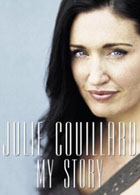 At the same time, probably the most sensible relevant comment I at least have come across is: “Australian economist John Kunkel, who served as Howard’s speechwriter from 2004 to 2007, said plagiarism in speech writing is not uncommon in any political system and said he doubts Howard was offended by the incident … I think he’d probably find it mildly amusing,’ Kunkel said. He’d probably have a good degree of sympathy for his good friend, Mr. Harper.'” (Of course, if all Bob Rae is trying to stress is that Stephen Harper was and still is a good friend of the Australian arch right-wing conservative John Howard – and, unlike Barack Obama, did warmly endorse the Iraq war, way back when it started – he certainly does have a point.)
At the same time, probably the most sensible relevant comment I at least have come across is: “Australian economist John Kunkel, who served as Howard’s speechwriter from 2004 to 2007, said plagiarism in speech writing is not uncommon in any political system and said he doubts Howard was offended by the incident … I think he’d probably find it mildly amusing,’ Kunkel said. He’d probably have a good degree of sympathy for his good friend, Mr. Harper.'” (Of course, if all Bob Rae is trying to stress is that Stephen Harper was and still is a good friend of the Australian arch right-wing conservative John Howard – and, unlike Barack Obama, did warmly endorse the Iraq war, way back when it started – he certainly does have a point.)
As far as Julie Couillard’s new book goes, some excerpts have been published in La Presse in Montreal today. And the most politically intriguing revelation here may be: “Harper says Quebec’s well-established separatist movement is a big threat and can only be stopped by the Conservatives … Bernier, according to Couillard, had a more relaxed attitude, telling her that Quebec independence was inevitable … That doesn’t scare me at all. It’s clear we’re heading in that direction. I don’t have any problems with that. I’m ready. I’m expecting it,’ she quotes him as saying. Polls show that around 45 percent of Quebecers back the idea of independence.”
Bloc Quebecois leader Gilles Duceppe must be especially amused by all this. And it will be interesting to see if he has anything further to say on the matter. In any case, Julie Couillard has at least briefly proved the one person somehow related to contemporary Canadian politics who has proved able to compete with the likes of Barack Obama and Sarah Palin in the minds of Canadians over the past several months. It is nice to see her warming up the crowd for the allegedly more serious and sober TV antics of Stephane Dion, Gilles Duceppe, Stephen Harper, Jack Layton, and Elizabeth May – in the debate from Quebec tonight.
(10) EARLIER REPORT FOR SEPTEMBER 29 …
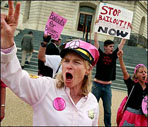 US bailout bill fails on first try. By about 2 PM ET on the afternoon of Monday, September 29, 2008, it was clear that supporters of the US financial bailout bill did not have quite enough votes in the House of Representatives to make it. The yeas needed 218 votes, and got only 205. The majority of Democrats voted yes, but the majority of Republicans voted no – on what began as a Republican administration proposal. Washington politicians are trying to negotiate a second vote on some revised bill for very soon. (Starting in the Senate this time, on the evening of Wednesday, October 1.) Meanwhile, the stock markets are not happy. (But they got a bit happier on Tuesday, September 30!)
US bailout bill fails on first try. By about 2 PM ET on the afternoon of Monday, September 29, 2008, it was clear that supporters of the US financial bailout bill did not have quite enough votes in the House of Representatives to make it. The yeas needed 218 votes, and got only 205. The majority of Democrats voted yes, but the majority of Republicans voted no – on what began as a Republican administration proposal. Washington politicians are trying to negotiate a second vote on some revised bill for very soon. (Starting in the Senate this time, on the evening of Wednesday, October 1.) Meanwhile, the stock markets are not happy. (But they got a bit happier on Tuesday, September 30!)
No wonder hardly anyone is interested in the Canadian federal election, even in Canada? The dramatic events with the bailout bill in Washington today just underline the difficulties of keeping Canadians even remotely interested in their own federal election on October 14 – or just two weeks tomorrow. As an article in the Jamaica Observer over this past weekend put it, what we have up here now is “An election you hardly hear about.”
This is especially unfortunate if the October 14 election does prove to be locally historic in its own right – with, e.g., some major demise of the Liberals (Canada’s old “natural governing party” since the late 19th century) conceivably now in motion. (Though certainly don’t bet the farm on it yet.) And this morning’s headline “CBC apologizes for column maligning Sarah Palin” seems just another strange straw in some similar wind.
Opinion poll data suggesting some major Liberal Party of Canada meltdown on October 14 (e.g., the Angus Reid Strategies survey that “placed the Tories at 40 per cent with the Liberals and NDP deadlocked at 21 per cent“) has now apparently given way to such headlines as: “NDP surge slows, Liberals hang on: Poll” ; “Tories’ big lead shrinking: poll” ; “Quebec separatists rising against Canada’s Conservative tide: poll” ; and “Tories falter around Montreal: poll.”
Yet another poll has found that “Few Canadians will be influenced by leaders’ debates” this week, on Wednesday, October 1 (en francais, with instant English translation for the great unwashed outside Quebec), and Thursday, October 2 (in English, and quite crazily on the same night as the US vice-presidential debate, from which Sarah Palin may emerge in some kind of very deep trouble. Or not?)
It nonetheless does still seem that, as Stephane Dion himself has more or less prophesied, the debates this week will be his last big chance to counteract all the false Tory (and NDP?) propaganda about what a hopeless leader he is. And even for those of us who have found him attractive in spite of his faults earlier on in this campaign (see report 4 below), it has been hard to sustain much practical enthusiasm for his prospects lately.
As also just noted, the Liberals’ fate in the polls has very lately seemed not quite so bad – and that of the Conservatives not quite so good. Still, it probably will take some unexpectedly dazzling performance by M. Dion – in both French and English debates – to revive any remotely serious prospects for a Liberal minority government. At the moment the big question still seems: Conservative minority or majority government? And, even with the star of Barack Obama freshly rising among the Yankees (and others) to the south of us (who “must south of us remain,” etc.), it still seems close to certain that Stephen Harper is going to be the next Canadian prime minister – with nothing remotely as large as 50% of the popular vote, even if he does win a majority of seats in Parliament!
(9) EARLIER REPORT FOR SEPTEMBER 26 …
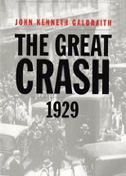 Canada can’t ignore financial screw-up. The great credit collapse on Wall Street – or whatever it is that the $700 billion bailout is supposed to be bailing out – is bound to have some impact on Canada too. So says the Governor of the Bank of Canada and the federal finance minister. And the performance of the Toronto Stock Exchange today does seem to be underlining the point.
Canada can’t ignore financial screw-up. The great credit collapse on Wall Street – or whatever it is that the $700 billion bailout is supposed to be bailing out – is bound to have some impact on Canada too. So says the Governor of the Bank of Canada and the federal finance minister. And the performance of the Toronto Stock Exchange today does seem to be underlining the point.
Meanwhile, back down south, the Vancouver Sun tells us: “Bailout plan stalls as conservative Republicans voice their opposition.” Paul Krugman in the New York Times is asking: “Where Are the Grown-Ups?” Way down in Mississippi, round one of the big Obama vs. McCain fight is going ahead tonight after all. [UPDATE: SEP 27, 12:15 AM:Â the early polls on US TV are saying Senator Obama won.] And “US financial turmoil hits Canadian campaign trail” too.
Tying the election to the economy, etc, etc. Guess who said: “I said for a long time, and nobody listened to me for the longest time, that my goal was to make conservatism the natural governing philosophy of the country.” (And what country did he have in mind?) And then what about Professor Michael Byers, the NDP candidate in Vancouver Centre, who wants to shut down the oilsands? And what about Sarah Palin and Katie Couric – and the Ohio farmer who has carved Palin’s image into his cornfields (just like Bert Brown and the Triple E Senate in Alberta, way back when?).
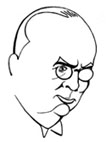 No doubt largely because of the sudden great credit collapse on Wall Street, there does seem to be some sudden agreement that in Canada too the economy has become the key focus of the coming federal election. And the Globe and Mail in Toronto has asked its online readers: “Which federal political leader do you think would be the best steward of Canada’s economy?” Guess who gets by quite some distance the most support here?
No doubt largely because of the sudden great credit collapse on Wall Street, there does seem to be some sudden agreement that in Canada too the economy has become the key focus of the coming federal election. And the Globe and Mail in Toronto has asked its online readers: “Which federal political leader do you think would be the best steward of Canada’s economy?” Guess who gets by quite some distance the most support here?
If you guessed Stephen Harper, of course you would be right. Some will say, well, these are just Globe and Mail readers. But many other online polls do suggest that, whatever else, this is not exactly a rabidly right-wing crowd. Of course again, polls of this sort are subject to various kinds of manipulation by skilled manipulators of public opinion statistics. And this result might just show, like much else in this Canadian federal election of 2008, that the Conservatives are the best organized political party and have the most resources – and the most energy too.
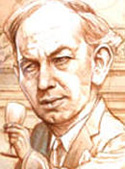 On the other hand, if you are a fan of Canadian political history you might recall that on July 28, 1930 – after the Great Crash of October 1929 which many financial people even in Toronto say will probably happen again, if Washington’s $700 billion bailout of Wall Street toxic debt doesn’t get started very soon, soon, soon – Canadians dutifully trotted to the polls and elected the Conservative R.B. Bennett (from Calgary) as prime minister of Canada. And if you are interested in Canadian economic history as well, you might also recall a footnote from the second appendix to an essay called “Government Ownership and the Canadian Scene,” by the great Harold Innis: In Canada, “We tend to put the Liberal party in power for periods of prosperity and the Conservative party for periods of depression and thereby to put the wrong party in power at the extremes of the business cycle.” (The American people seem somewhat more clever in this respect, despite Canadian popular opinion on all such subjects – and thus Barack Obama might actually be elected president on November 4.)
On the other hand, if you are a fan of Canadian political history you might recall that on July 28, 1930 – after the Great Crash of October 1929 which many financial people even in Toronto say will probably happen again, if Washington’s $700 billion bailout of Wall Street toxic debt doesn’t get started very soon, soon, soon – Canadians dutifully trotted to the polls and elected the Conservative R.B. Bennett (from Calgary) as prime minister of Canada. And if you are interested in Canadian economic history as well, you might also recall a footnote from the second appendix to an essay called “Government Ownership and the Canadian Scene,” by the great Harold Innis: In Canada, “We tend to put the Liberal party in power for periods of prosperity and the Conservative party for periods of depression and thereby to put the wrong party in power at the extremes of the business cycle.” (The American people seem somewhat more clever in this respect, despite Canadian popular opinion on all such subjects – and thus Barack Obama might actually be elected president on November 4.)
Michael Byers in Vancouver Centre. It similarly seems somehow not quite right that the New Democrat star candidate in Vancouver Centre, Michael Byers (also the occupant of the Canada Research Chair in International Law and Politics at the University of British Columbia) should finally gain some national attention by somewhat foolishly calling “for the shutdown of Alberta’s oilsands,” at an all-candidates meeting for his riding, held at the UBC School of Journalism.
 As reported in the Vancouver Sun, Byers’s suggestion that “the oilsands should be gradually shut down to save polar bears, surprised even his opponents since it seemed to go against his party’s platform … NDP Leader Jack Layton said early in the campaign his party would introduce a moratorium on expansion of the oilsands, something Byers also supports, but Layton did not call for existing projects to be shut down.”
As reported in the Vancouver Sun, Byers’s suggestion that “the oilsands should be gradually shut down to save polar bears, surprised even his opponents since it seemed to go against his party’s platform … NDP Leader Jack Layton said early in the campaign his party would introduce a moratorium on expansion of the oilsands, something Byers also supports, but Layton did not call for existing projects to be shut down.”
Whether all this will seriously harm Byers’s chances of winning the rather feisty riding of Vancouver Centre for the New Democrats is of course unclear. The seat has long been held by the Liberals’ Hedy Fry, who is running again and has her own long history of saying foolish things. Similarly (again), “Conservative candidate Lorne Mayencourt said shutting down the oilsands is unrealistic and that Byers’s statement would not help the NDP court voters in Alberta.” But for the great majority of Canadians who do not live in Alberta, shutting down the oilsands is not exactly an altogether crazy idea, from the standpoint of the kind of hyper-aggressive environmental policy that just might appeal to many voters in Vancouver Centre.
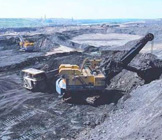 Up to this point, at any rate, it seemed something of a coup for the NDP to have Michael Byers among its current not exactly huge selection of star candidates. According to a Vancouver Sun article from this past July, “Prof took NDP bid after checking out Liberals.” But according to a May 2007 article from “The Torch … a group weblog focusing on the Canadian military,” Byers has “donated at least four times to the federal NDP.” He “wrote a defence policy discussion paper for the NDP in the spring of 2005 that was praised by Bill Blaikie, the party’s defence critic at that time.” He seems to have been “a delegate to the 2006 NDP convention in Quebec,” and has a longstanding friendship with “Dawn Black, an NDP Member of Parliament.”
Up to this point, at any rate, it seemed something of a coup for the NDP to have Michael Byers among its current not exactly huge selection of star candidates. According to a Vancouver Sun article from this past July, “Prof took NDP bid after checking out Liberals.” But according to a May 2007 article from “The Torch … a group weblog focusing on the Canadian military,” Byers has “donated at least four times to the federal NDP.” He “wrote a defence policy discussion paper for the NDP in the spring of 2005 that was praised by Bill Blaikie, the party’s defence critic at that time.” He seems to have been “a delegate to the 2006 NDP convention in Quebec,” and has a longstanding friendship with “Dawn Black, an NDP Member of Parliament.”
If you still can’t quite remember who Michael Byers is – or was before his political career began this past summer – he wrote the 2007 book Intent for a Nation: What is Canada For? (a kind of more optimistic update of George Grant’s 1965 book Lament for a Nation: The Defeat of Canadian Nationalism). He has also published an impressive number and assortment of articles in such non-academic journals as the Vancouver Sun, the Toronto Star, the Globe and Mail, and the London Review of Books.
For further information you can check out the UBC Department of Political Science website. Whether he manages to take Vancouver Centre away from Hedy Fry and the Liberals on October 14 still seems like quite an interesting question, regardless of what he thinks or has said about the oilsands in Alberta. (His own explanation of his remarks to the Vancouver Sun is: “All three opposition parties are committed to a result that would mathematically entail the shutting down of the tarsands.” He urges that the oilsands are “becoming the largest CO2 source on the planet” and will eventually have to be shut down: “It is a goal that we seek to achieve gradually,” while reducing “the negative impact on families and workers in the tar sands.”)
 A bit more on the lovely Governess of Alaska, etc. When you read that a likeness of Sarah Palin, “complete with her familiar updo hairstyle and eyeglasses” has been carved on Ohio farmer Duke Wheeler’s six-hectare corn maze near the town of Whitehouse, you might suddenly remember that back in the 1980s Alberta farmer Bert Brown carved a giant “EEE” on his wheat fields, to help promote his daydream of a Triple E Senate.
A bit more on the lovely Governess of Alaska, etc. When you read that a likeness of Sarah Palin, “complete with her familiar updo hairstyle and eyeglasses” has been carved on Ohio farmer Duke Wheeler’s six-hectare corn maze near the town of Whitehouse, you might suddenly remember that back in the 1980s Alberta farmer Bert Brown carved a giant “EEE” on his wheat fields, to help promote his daydream of a Triple E Senate.
Some 20 years later Mr. Brown is now a rare elected member of the Senate of Canada. But his Triple E Senate is no closer than ever. For the time being, what this may or may not say about the fate of Ms. Palin seems unclear.
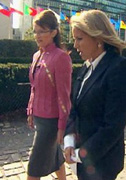 Meanwhile, far away in another part of the home of the brave and the land of the free (or is it the other way around?), the Los Angeles Times is reporting: “Palin talks to Couric – and if she’s lucky, few are listening … The financial crisis has an upside for the Republican vice presidential candidate: It takes the spotlight away as she begins answering more pointed questions from the media …”
Meanwhile, far away in another part of the home of the brave and the land of the free (or is it the other way around?), the Los Angeles Times is reporting: “Palin talks to Couric – and if she’s lucky, few are listening … The financial crisis has an upside for the Republican vice presidential candidate: It takes the spotlight away as she begins answering more pointed questions from the media …”
If you haven’t quite caught this particular girl on girl action yet, you can check it out on CBS News, at “Katie Couric does Sarah Palin, I” and “Katie Couric does Sarah Palin, II.” You may finally find yourself wondering who you’d rather be marooned on a desert island with: Ms. Palin or Ms. Couric – political philosophy strictly aside.
Randall White is the author of a number of books on Canadian history and politics, including: Voice of Region: The Long Journey to Senate Reform in Canada and Ontario Since 1985. He has also worked as a public policy consultant at all three levels of government in Canada. He will continue to report and comment on electoral developments in Canada (and the United States) between now and October 14.You can complain about what he writes by emailing him at rwhite@eastendbooks.com.
(8) EARLIER REPORT FOR SEPTEMBER 22 …
 Just how badly off is the cause of progress in Canadian federal politics today anyway? If you are seriously bothered by the prospect of perhaps even a majority government in Ottawa working quite systematically (to say nothing of guilefully and worse) “to pull Canadians towards conservatism,” three developments on Monday, September 22, 2008 may or may not make you feel a little better, temporarily at least?
Just how badly off is the cause of progress in Canadian federal politics today anyway? If you are seriously bothered by the prospect of perhaps even a majority government in Ottawa working quite systematically (to say nothing of guilefully and worse) “to pull Canadians towards conservatism,” three developments on Monday, September 22, 2008 may or may not make you feel a little better, temporarily at least?
First, the Dion Team Liberals released their full platform for the October 14 Canadian federal election this morning, hoping that it will “bite into Tory lead.” Second, New Democrat leader Jack Layton “opens coalition door” – sort of, at any rate, and has on TVÂ “stressed he’s never allowed partisanship to trump the greater public good..” Finally, this morning on my way to work I noticed that the Green Party has the most lawn signs up on my street. (Which may not be all that good an omen when you think about it, but somehow it did cheer me up.)
Two cheers for Ms. Mallick at the CBC? Heather Mallick’s September 5 tirade against the white-trash Alaskan with the porno-actress look, Sarah Palin, on the CBC News website (and in the Guardian in the UK), is old news now. But that also means that it can start to be evaluated sensibly – and there seems little doubt that her view of Ms. Palin is not politically shrewd.
The parts of Ms. Mallick’s CBC News website column that most annoyed her right-wing critics, in both the United States and Canada, can be summarized by quoting from the September 18 FOXNews.com critique “Columnist’s Labeling Palin Backers White Trash’ Spurs Review at Canadian TV.” It begins with: “The Canadian Broadcasting Corporation is reviewing complaints from both Americans and Canadians about a Web site columnist who recently described Sarah Palin’s supporters as white trash,’ compared the vice presidential candidate to a porn actress’ and called her daughter’s boyfriend a redneck’ and ratboy.'”
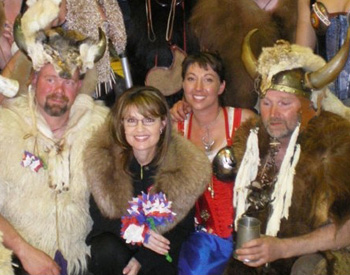 FOX News (er … that should be “Noise” in Keith Olbermann’s MSNBC lexicon, of course) also noted that “On the same day” Ms. Mallick’s “incendiary column” appeared on the CBC News website, “Britain’s Guardian newspaper published another column by Mallick in which she trashed Palin’s home state of Alaska as a frontier state full of drunks and crazy people.'”
FOX News (er … that should be “Noise” in Keith Olbermann’s MSNBC lexicon, of course) also noted that “On the same day” Ms. Mallick’s “incendiary column” appeared on the CBC News website, “Britain’s Guardian newspaper published another column by Mallick in which she trashed Palin’s home state of Alaska as a frontier state full of drunks and crazy people.'”
FOX Noise went on: “In the CBC story, Mallick wrote that John McCain’s running mate added nothing to the ticket that the Republicans didn’t already have sewn up, the white trash vote’ … She proceeded to write that the Alaska governor has a toned-down version of the porn actress look favored by this decade’s woman, the overtreated hair, puffy lips and permanently alarmed expression’ … She also questioned why the Palins were allowing Levi Johnston – 17-year-old Bristol Palin’s boyfriend and father of her unborn baby – into the family … What normal father would want Levi “I’m a f-n’ redneck” Johnson prodding his daughter?’ Mallick asked’ … Mallick also wrote …that Republican men, whom she called sexual inadequates,’ must think that women would vote for Palin just because she’s a woman … Mallick also blasted Alaska as Canada’s ugly stepchild….’Alaska is our redneck cousin, our Yukon territory forms a blessed buffer zone … Alaska is the end of the line.'”
For a somewhat more complete picture, you might consult as well the following additional critiques of Ms. Mallick’s tirade(s) against Ms. Palin: “Canadian columnist’s diatribe against Palin stokes anger in the US” ; “CBC’s Mallick: White Trash’ Palin Has Porn Actress Look,’ Smart People’ Flee Small Towns” ; “Heather Mallick Calls Sarah Palin ‘White Trash’ Rips Style” ; and “A dissection of Mallick’s CBC column by James Lileks.”
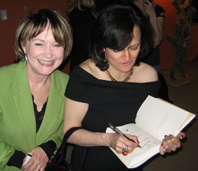 For the original primary sources, see the two columns themselves: (1) “A Mighty Wind blows through Republican convention” [on the CBC website] ; and (2) Ms. Mallick’s Guardian column as reproduced on her website. Finally “Heather Mallick” on Wikipedia starts with “Heather Mallick (born 1959) is a controversial Toronto-based columnist, author and lecturer,” and offers some additional useful insight, including these pieces of biographical background: “Mallick was born in Norway House, Manitoba and raised in the northern Ontario town of Kapuskasing and in other remote communities where her father worked as a physician, Mallick attended the University of Toronto where she received a bachelor’s and Master of Arts degrees in English Literature. She also earned a bachelor’s degree in Journalism from Ryerson University.”
For the original primary sources, see the two columns themselves: (1) “A Mighty Wind blows through Republican convention” [on the CBC website] ; and (2) Ms. Mallick’s Guardian column as reproduced on her website. Finally “Heather Mallick” on Wikipedia starts with “Heather Mallick (born 1959) is a controversial Toronto-based columnist, author and lecturer,” and offers some additional useful insight, including these pieces of biographical background: “Mallick was born in Norway House, Manitoba and raised in the northern Ontario town of Kapuskasing and in other remote communities where her father worked as a physician, Mallick attended the University of Toronto where she received a bachelor’s and Master of Arts degrees in English Literature. She also earned a bachelor’s degree in Journalism from Ryerson University.”
Like others, I have been reading Heather Mallick’s writing for a number of years now, and often enough find it refreshing. As her Wikipedia documentation notes, she does have “left-of-centre” views, and if you really don’t like such things you will probably never like what she writes.
At the same time, she is more of a whimsical and sometimes gently acidic social critic than she is any kind of astute political analyst. In both her CBC News website and Guardian columns she said out loud whimsical and gently acidic things about Sarah Palin that many left-of-centre people in Canada (and no doubt the USA today too) have thought and said quietly among themselves. The right wing in North America has said much more vicious and nasty things about its opponents over the past several decades, and it is more than a little disingenuous for right-of-centre critics to complain when someone like Heather Mallick returns the favour.
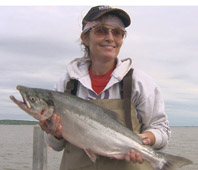 It is true enough, however, that when Ms. Mallick says Ms. Palin “added nothing to the ticket that the Republicans didn’t already have sewn up, the white trash vote,” she no doubt does betray a certain political naivety. In fact, Sarah Palin has mobilized an important part of the Republican base that John McCain was having trouble getting interested in his campaign. She is both a more talented and (from left-of-centre points of view) dangerous figure than Ms. Mallick gives her credit for. Coming from the far north herself, Ms. Mallick does seem to know a few things about Ms. Palin that the rest of us have not quite caught up with yet. But in the wider world of current North American electoral entertainment and hard-nosed political realism, she can be criticized for underestimating her enemy. And the price of that can sometimes be that your enemy wins.
It is true enough, however, that when Ms. Mallick says Ms. Palin “added nothing to the ticket that the Republicans didn’t already have sewn up, the white trash vote,” she no doubt does betray a certain political naivety. In fact, Sarah Palin has mobilized an important part of the Republican base that John McCain was having trouble getting interested in his campaign. She is both a more talented and (from left-of-centre points of view) dangerous figure than Ms. Mallick gives her credit for. Coming from the far north herself, Ms. Mallick does seem to know a few things about Ms. Palin that the rest of us have not quite caught up with yet. But in the wider world of current North American electoral entertainment and hard-nosed political realism, she can be criticized for underestimating her enemy. And the price of that can sometimes be that your enemy wins.
(On the other hand again, when James Lileks complains about Ms. Mallick’s accompanying sceptical or at least quizzical review of “Episode 6 of Season 2” of the very excellent and now Emmy-Award-winning AMC TV series Mad Men, he is just being foolish, and more than a little naive himself. When he says: “Of course it scares her. Everything outside the tight, airless bubble in which she lives scares her, from those yellin’ knocked-up hillbilly wimen to the menfolk who love em, from the crazy furrin-doubting Murcans who bring up their heads from the trough only to bark for nuther servin’ of Freedom Fries” – he just shows that he has no idea at all about just how scary it is to be “born in Norway House, Manitoba and raised in the northern Ontario town of Kapuskasing.” Once you have survived that you are no doubt tough enough to never be afraid of anything else again – including the likes of FOX Noise, etc, etc, etc.)
(7) EARLIER REPORT FOR SEPTEMBER 18 …
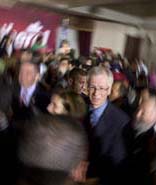 Race becomes more interesting … says who? According to the Toronto Star, a new Canadian Press Harris-Decima survey taken over the last four days suggests that both “the Conservatives and the Liberals have lost ground to the NDP and Greens,” and that the party of Stephen Harper “may have slipped further from majority-government territory.”
Race becomes more interesting … says who? According to the Toronto Star, a new Canadian Press Harris-Decima survey taken over the last four days suggests that both “the Conservatives and the Liberals have lost ground to the NDP and Greens,” and that the party of Stephen Harper “may have slipped further from majority-government territory.”
According to Harris-Decima president Bruce Anderson: “This race continues to become more interesting, and outcomes are becoming more varied and complex.” This is certainly good news. But someone should tell it to the Canadian people who live on my street – who still don’t seem all that interested (and with only 25 days to go).
Would the Liberals do better with a Team Canada approach? Lawrence Martin at the Globe and Mail aruges that Stephane Dion “should do something novel, as some in the party are saying, and pick up on an idea that’s been out there a while. To put maximum emphasis on his high-powered team, Mr. Dion should announce in the middle of the campaign his future cabinet – tentative picks of the leading portfolio holders.”
Mr. Martin goes on: “If there is one thing Canadians might be attracted to after so many years of one-man bands, it is a big-team approach. We have had what was called the friendly dictatorship of Jean Chrtien, the little bouncer from Shawinigan. In the past two years, there’s been a similar approach minus, until this campaign, the friendly part.”
I’ve always liked this idea myself. And there have certainly been moments during the 39th Parliament of Canada when even the opposition Liberals in disarray did seem to have considerably more front-bench depth than the minority-governing Conservatives.
On the other hand, Chantal Hebert: at the Toronto Star has been urging that: “If the Liberals were serious about reversing the tide of the election campaign – and every poll indicates they should be – they would hide Bob Rae and pull Paul Martin from obscurity.”
Recent pointed criticism of Mr. Rae’s weak stewardship of the Ontario provincial government in earlier economic hard times from Mr. Harper himself underlines Chantal Hebert’s point. Yet Mr. Martin can’t really be a member of the team today – can he?
Local rumour similarly has it that Michael Ignatieff is currently in trouble in his own riding. Morever, even with Ignatieff – and/or even former Prime Minister Martin – the Liberal team at large still has very little talent from Western Canada.
For that (which, especially given the Conservative strength there, is very important) they would need help from the New Democrats. But Jack Layton’s party still seems to think it can actually replace the Liberals as the standard bearer for the cause of progress in Canada.
Ms. May’s Green Party does appear intriguingly fresh and intriguing all of a sudden, with her welcome charge into the TV debates on the first two days of October. But the question here still is: can the Greens win any seats at all?
In the very end it is still very hard to see how this election can end with anything other than some sort of government – minority or majority (and probably the former the smart money still seems to be saying) – led by Stephen Harper.
This may well be why so many Canadian people are still not all that interested. And it may take some very dramatic development that may never happen to change things over the next 25 days. Still, if you were interested to start with because you are an incurable junkie, it probably is getting a bit more interesting now – just like Harris-Decima president Bruce Anderson says.
(6) EARLIER REPORT FOR SEPTEMBER 15 …
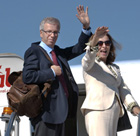 How much trouble are the Liberals in? For starters, just look at the Harris/Decima results, in the useful summary of recent Canadian election polls compiled by Andrew Heard, at the Simon Fraser University political science department – Aug 710: Libs 33%, Cons 32%; Aug 2124: Libs 34%, Cons, 33%; Sep 48: Libs 28%, Cons 36%; Sep 811: Libs 26%, Cons 41%; Sep 1013: Libs 26%, Cons 40%.
How much trouble are the Liberals in? For starters, just look at the Harris/Decima results, in the useful summary of recent Canadian election polls compiled by Andrew Heard, at the Simon Fraser University political science department – Aug 710: Libs 33%, Cons 32%; Aug 2124: Libs 34%, Cons, 33%; Sep 48: Libs 28%, Cons 36%; Sep 811: Libs 26%, Cons 41%; Sep 1013: Libs 26%, Cons 40%.
You can read these kinds of results as “the sign of an electoral disaster to come.” Or, with an eye on the August data that look notably better, you can say that Liberal TV advertising is just starting, that Stephane Dion is a congenital late bloomer, and that things will look at least a bit better this time next week. Check back for further reports then. (Meanwhile, a new EKOS poll, just added to Andrew Heard’s list tonight, suggests that “Canada’s opposition Liberals could suffer their worst electoral showing in nearly a quarter century.”)
Is Canada really becoming a more conservative country? “I think the Canadian public has become more conservative,” Stephen Harper said over the weekend, at an election stop in New Brunswick. And some are already wondering whether this is the kind of irrepressible dumb remark that finally lost him a majority government in 2006? (And/or the kind of thing that might actually improve Liberal polling results in the days more immediately ahead?)
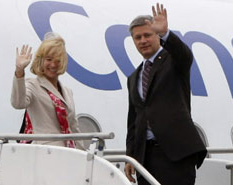 It is of course important to note that Mr. Harper went on in his New Brunswick speech: “At the same time I don’t want to say the Canadian public is overwhelmingly conservative or that it is necessarily as conservative as everybody in our party … That means not only that we want to pull Canadians towards conservatism but Conservatives also have to move towards Canadians if they want to continue to govern the country.”
It is of course important to note that Mr. Harper went on in his New Brunswick speech: “At the same time I don’t want to say the Canadian public is overwhelmingly conservative or that it is necessarily as conservative as everybody in our party … That means not only that we want to pull Canadians towards conservatism but Conservatives also have to move towards Canadians if they want to continue to govern the country.”
If you stress the last clause here – “Conservatives also have to move towards Canadians if they want to continue to govern the country” – you can of course read all this as a sign of Mr. Harper’s growing prime ministerial wisdom, and cunning acceptance of contemporary Canadian political culture. (Or at least that side of Canadian political culture that the California writer Michael Chabon alluded to when he recently described the “gathered tribes of the Democratic Party” at the Denver convention as “hacks, Teamsters, hat ladies, New Mexicans, residents of those states most nearly resembling Canada, Jews of South Florida, dreadlocks, crewcuts, elderlies, and goths.” [And italics added of course.] )
There have been a number of signs over the past few weeks that this kinder and gentler reformed and somewhat liberalized neo-con persona has prudently seized hold of Stephen Harper’s political mind. And it isn’t just a matter of wearing soft-looking sweaters in his interminable new Con Party TV ads.
It is also about at least pretending to soften his position on Afghanistan, giving fairly significant blobs of alleged job-saving Ottawa cash away to various branches of the auto industry in Southern Ontario, pretending that not only does he care about the environment but that he even has a more sensible policy on the subject than anyone else, talking about Arctic sovereignty, apologizing to aboriginal Canadians, appealing in almost acceptable French to the Quebecois nation (whatever that is), and even cracking a clever “Do you like handcuffs?” joke with This Hour Has 22 Minutes star Geri Hall in an (unscheduled?) Halifax TV interview – and then offering some very sly and almost hip facial gestures and body language, when she giggled and said “Should I like handcuffs?”
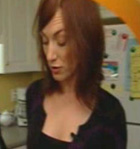 (This is no doubt the kind of prime minister at least a great many non-conservative Canadians want to have – almost like Pierre Trudeau. And as Ms. Hall explained: “The way I look at it, it’s a day in Canada when I was not Tasered. And that’s probably a good thing.”)
(This is no doubt the kind of prime minister at least a great many non-conservative Canadians want to have – almost like Pierre Trudeau. And as Ms. Hall explained: “The way I look at it, it’s a day in Canada when I was not Tasered. And that’s probably a good thing.”)
It may in fact be the recent strong doses of this kinder and gentler reformed and somewhat liberalized neo-con persona, unleashed on an unsuspecting Canadian public, that have boosted the Conservative polling results over the past few weeks. In the past Canadian voters in their own federal political personae have intermittently voted for the old Progressive Conservatives (most recently the Brian Mulroney Progressive Conservatives won two majority governments, before the debacle of 1993) – to say nothing of the understandably alcoholic John A. Macdonald’s Liberal Conservatives in the 19th century founding era of the present confederation.
Mr. Harper, as many will remember, more or less, has himself dispensed with the Progressive Conservative label, and changed the name to the Conservative Party of Canada. (As part of various permutations involving the old Reform Party from Western Canada, and then the so-called Canadian Alliance, which finally allied with the old Progressive Conservatives, etc, etc.)
You might wonder whether Mr. Harper, in the midst of his new-found wisdom about how “Conservatives also have to move towards Canadians if they want to continue to govern the country” might not be thinking about going back to the old Progressive Conservative label. That could even be the shortest distance to the ultimate nirvana of a majority government.
But Mr. Harper still wants to “pull Canadians towards conservatism.” Then you remember that in his New Brunswick speech this past weekend Stephen Harper also said “That means not only that we want to pull Canadians towards conservatism.” And many of us at any rate will continue to wonder just what he means by this.
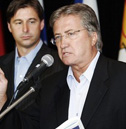 As the (still) Progressive Conservative Newfoundland Premier Danny Williams has lately been reminding us, Stephen Harper did indulge in a lot of flaming, right-wing neo-con (and even somewhat anti-Canadian?) rhetoric in an earlier incarnation. When he says “we want to pull Canadians towards conservatism,” he opens the door to Stephane Dion’s Liberal rhetoric about Stephen Harper’s “hidden agenda,” and headlines like “Dion says Harper can’t be trusted.” (Even if not too many ordinary Canadian voters seem to be paying much attention at the moment?)
As the (still) Progressive Conservative Newfoundland Premier Danny Williams has lately been reminding us, Stephen Harper did indulge in a lot of flaming, right-wing neo-con (and even somewhat anti-Canadian?) rhetoric in an earlier incarnation. When he says “we want to pull Canadians towards conservatism,” he opens the door to Stephane Dion’s Liberal rhetoric about Stephen Harper’s “hidden agenda,” and headlines like “Dion says Harper can’t be trusted.” (Even if not too many ordinary Canadian voters seem to be paying much attention at the moment?)
Such related recent headlines as “Harper says opposition bucks conservative trend” and “Harper says Canada economy solid” – on a Monday, September 15 full of US news about how “Big Insurer Gets Lifeline as Markets Fall” and “Obama, McCain Weigh In on Wall St. Turmoil” – seem to defy at least a few plain facts of contemporary history as well.
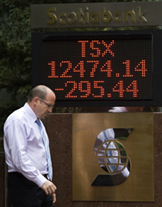 It is no doubt true that over the “past two decades” in Canada, as in many other parts of the global village, “it has become generally accepted that balanced budgets, free trade and lower taxes are good things.” But it is equally true that the current US financial crisis, and its insistent echoes in the wider world economy, have cast some dark shadows on the kinds of aggressively conservative (or right-wing or neo-conservative or social Darwinian or mindlessly 19th century free market) economic policies that Mr. Harper still alludes to in his political rhetoric.
It is no doubt true that over the “past two decades” in Canada, as in many other parts of the global village, “it has become generally accepted that balanced budgets, free trade and lower taxes are good things.” But it is equally true that the current US financial crisis, and its insistent echoes in the wider world economy, have cast some dark shadows on the kinds of aggressively conservative (or right-wing or neo-conservative or social Darwinian or mindlessly 19th century free market) economic policies that Mr. Harper still alludes to in his political rhetoric.
So the New York Times is telling us today that even Senator McCain is talking about the “tremendous turmoil in our financial markets and on Wall Street.” He agrees that: “People are frightened by these events. Our economy, I think still, the fundamentals of our economy are strong. But these are very, very difficult times. And I promise you we will never put America in this position again. We will clean up Wall Street. We will reform government.”
Barack Obama of course goes further than this: “I certainly don’t fault Senator McCain for these problems, but I do fault the economic philosophy he subscribes to … It’s a philosophy … that says we should give more and more to those with the most and hope that prosperity trickles down to everyone else … This country can’t afford another four years of this failed philosophy … The challenges facing our financial system today are more evidence that too many folks in Washington and on Wall Street weren’t minding the store … policies that have shredded consumer protections, loosened oversight and regulation, and encouraged outsized bonuses to CEOs while ignoring middle-class Americans have brought us to the most serious financial crisis since the Great Depression.”
Can he pull Canadians towards a Conservative majority government too? Moreover, if it is true that the Canadian financial system actually is not in quite as much difficulty as the US system, for the moment, that has virtually nothing to do with any “conservative” economic policies that Mr. Harper’s government has implemented since February 2006.
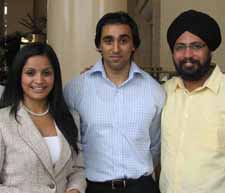 It does have something to do with longstanding liberal (and even Liberal) policies of tighter financial regulation and public oversight in the traditional blue-state country of Canada, that Mr. Harper was quite quick to criticize in his youth.
It does have something to do with longstanding liberal (and even Liberal) policies of tighter financial regulation and public oversight in the traditional blue-state country of Canada, that Mr. Harper was quite quick to criticize in his youth.
(More than a little arguably, as well, the person most responsible for putting the current Canadian political economy in somewhat better shape to withstand the present global financial turbulence is former Liberal finance minister Paul Martin.)
Of course, even if you have almost reluctantly come to admire Stephane Dion as the real class of this current Canadian federal election campaign (as in report 3 below, e.g.), it is easy enough to conclude that the Liberal Party of Canada in its current incarnation certainly does not deserve any majority government – and probably could not convince the increasingly careerist NDP leader Jack Layton to co-operate for any serious length of time with a Liberal minority government. (Although it would certainly be very nice if this could happen, for a great many Canadians.)
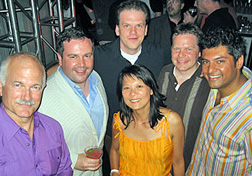 It may similarly be that, in the midst of a short campaign, overwhelmed by Conservative TV ads, voter ennui, and confusion from the much more world-shattering events down south, the Canadian people are about to entrust Stephen Harper with at least some kind of working majority of seats in Parliament, as a number of the current opinion polls do suggest, clearly enough.
It may similarly be that, in the midst of a short campaign, overwhelmed by Conservative TV ads, voter ennui, and confusion from the much more world-shattering events down south, the Canadian people are about to entrust Stephen Harper with at least some kind of working majority of seats in Parliament, as a number of the current opinion polls do suggest, clearly enough.
On the other hand, over the next four weeks enough Canadian voters just might discover and digest Mr. Harper’s remarks this past weekend in New Brunswick, about how – say whatever else you like – Stephen Harper really does want to “pull Canadians towards conservatism,” even though, in yet another recent poll, 66% of Canadians said they wanted Barack Obama as President of the United States, while “only 13 per cent would vote for McCain, the Republican.” (That’s quite a lot of pullling!)
 And when Mr. Harper’s chosen non-fixed voting day of Tuesday, October 14, 2008 finally rolls around, the Canadian people in their infinite subtle wisdom – and in British Columbia and Atlantic Canada, as well as Ontario and Quebec – may finally decide yet again that the most the still stubbornly non-progressive Conservative Mr. Harper deserves in this blue-state country is more or less the same kind of slender minority government he has now.
And when Mr. Harper’s chosen non-fixed voting day of Tuesday, October 14, 2008 finally rolls around, the Canadian people in their infinite subtle wisdom – and in British Columbia and Atlantic Canada, as well as Ontario and Quebec – may finally decide yet again that the most the still stubbornly non-progressive Conservative Mr. Harper deserves in this blue-state country is more or less the same kind of slender minority government he has now.
(And if this is what happens, we’ll see what he does then, as he reminds himself and his more ideologically ardent cabinet colleagues that “Conservatives also have to move towards Canadians if they want to continue to govern the country.”)
(5) EARLIER REPORT FOR SEPTEMBER 12 …
 Another tale of two polls: Two soundings of the public mind, both covering September 811, suggest somewhat different scenarios for the October 14 federal election. A Harris/Decima survey shows potential “Conservative majority” results (of parliamentary seats at least), not unlike the Segma poll from last week. It gives Conservatives 41% of the popular vote, compared with 26% for the Liberals, 14% for the NDP, 9% for the Greens, and 8% for the Bloc Quebecois. An EKOS poll with a somewhat smaller margin of error, on the other hand, merely prophesies a “Conservative minority” government – with Conservatives at 36%, Liberals at 26%, and the NDP at 19%. Meanwhile, as of 18:45 PDT this evening, the UBC Election Stock Market was predicting 145 seats in Ottawa for the Conservatives – still 10 short of a bare majority.
Another tale of two polls: Two soundings of the public mind, both covering September 811, suggest somewhat different scenarios for the October 14 federal election. A Harris/Decima survey shows potential “Conservative majority” results (of parliamentary seats at least), not unlike the Segma poll from last week. It gives Conservatives 41% of the popular vote, compared with 26% for the Liberals, 14% for the NDP, 9% for the Greens, and 8% for the Bloc Quebecois. An EKOS poll with a somewhat smaller margin of error, on the other hand, merely prophesies a “Conservative minority” government – with Conservatives at 36%, Liberals at 26%, and the NDP at 19%. Meanwhile, as of 18:45 PDT this evening, the UBC Election Stock Market was predicting 145 seats in Ottawa for the Conservatives – still 10 short of a bare majority.
Will Justin Trudeau win in Papineau? The Conservatives may have the polls on their side, for the moment. But one thing they don’t have is a son of Pierre Trudeau, running for the Liberals in the Montreal “working-class riding of Papineau,” against the Bloc Quebecois. Justin Trudeau doesn’t mind that Quebec nationalist intellectuals dismiss him as “a lightweight.” He just works hard at earning votes “one handshake at a time, one conversation at a time.”
The Bloc took Papineau from former Liberal cabinet minister Pierre Pettigrew in 2006. Can Justin Trudeau win it back in 2006? He won a contested Liberal nomination, and has been working the riding for the last 18 months. He says that’s what will count on October 14: “I don’t have to impress anyone except the people here.”
As a recent Canadian Press article explains, he “isn’t a flashy campaigner but he takes the time to chat with people and listens when they speak … Not all the questions focus on public policy. One woman wants to know how his son, born last October, is doing. Someone else writes to his Internet site asking if he believes visiting extraterrestrials would be protected by the Charter of Right. He says yes.”
Justin Trudeau agrees that current Liberal leader Stephane Dion does not have the kind of raw magnetism that made Pierre Trudeau such an intriguing figure, when he first became Canadian prime minister, some 40 years ago now. Of M. Dion Justin says: “Obviously he doesn’t have the flash and charisma that people always say they would like to see in a leader.” Instead, Justin finds, voters “talk about his integrity, his intelligence, his deep and respectful world view.” Dion “is a man who is not only ready to be prime minister of Canada but is extraordinarily fit for it.”
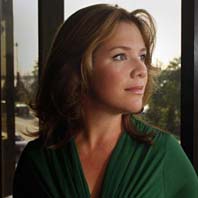 Justin Trudeau is being helped in his 2008 campaign in Papineau (named of course after the great French Canadian leader in the 183738 Rebellions, Louis Joseph Papineau) by his mother Margaret, his brother Alexandre, and his remarkable wife Sophie Gregoire Trudeau.
Justin Trudeau is being helped in his 2008 campaign in Papineau (named of course after the great French Canadian leader in the 183738 Rebellions, Louis Joseph Papineau) by his mother Margaret, his brother Alexandre, and his remarkable wife Sophie Gregoire Trudeau.
The remarkable Sophie was in fact in Windsor, Ontario last night, “as the featured speaker at a conference by the Bulimia Anorexia Nervosa Association (BANA) … Based locally, the association helps people across southwestern Ontario deal with food and body image related disorders.”
As an article in the Windsor Star explains: “With her disarming smile and healthy glow, you wouldn’t expect eTalk television personality Sophie Gregoire-Trudeau to have suffered from an eating disorder … But the 33-year-old entertainment journalist said she spent years struggling with bulimia earlier in her life.”
Nowadays of course Sophie is just fine – and among other things “four months pregnant with her second child.” Many, many years ago, in the middle of the 18th century, what is now Windsor, Ontario was the site of the most westerly cluster of French Canadian agricultural settlement, not directly associated with the fur trade. It says something about one of the many unsung long continuities in Canadian life today that a 33-year-old lady from Montreal has just visited Windsor to speak to a conference there.
It is easy enough to imagine that, were he still alive, Pierre Trudeau would be rather pleased about his eldest son’s marriage to Sophie Gregoire. She has about her something of the old Trudeau style that some Canadians have never much liked – but that many have, and that arguably helps give Pierre Trudeau his current status as Canada’s most interesting and unusual prime minister. (Whatever else you might think about him, and however much you may prefer the usual over the unusual yourself – as Stephen Harper seems to be urging most sensible Canadians still do today. Things were different in the 1960s, as some of us can still recall.)
The Canadian Press has asked Sophie’s husband, Justin Trudeau, whether he “feels his famous dad over his shoulder,” as he campaigns in the Montreal riding of Papineau today. “Every day, every day,’ he says flashing a smile … Any time I feel I’m making a difference in the world for the better, that brings me close to what my father stood for.'” So … say what you like, and whoever the next prime minister of Canada may be, on October 14, 2008 it will be interesting to see whether Justin Trudeau can take Papineau for the Liberals, from the Bloc Quebecois.
(4) EARLIER REPORT FOR SEPTEMBER 10 …
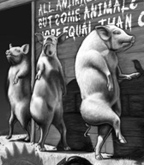 Elizabeth May in TV debates: It is now happily clear that first NDP leader Jack Layton and then Conservative Prime Minister Stephen Harper have backed down on their initial objections to including Green Party leader Elizabeth May in the TV leaders debates on October 1 and 2.
Elizabeth May in TV debates: It is now happily clear that first NDP leader Jack Layton and then Conservative Prime Minister Stephen Harper have backed down on their initial objections to including Green Party leader Elizabeth May in the TV leaders debates on October 1 and 2.
Puffins and pigs. “Pooping puffin knocks Tories off message, prompts Harper apology” is more good news for good manners. But “Obama accused of sexism for ‘lipstick on a pig’ remark” just shows that Republicans in the USA can’t take a joke. Of course there’s nothing wrong with pigs. They are the smartest animals. But they only get to run real countries in Animal Farm.
A tale of two more polls: As the Vancouver Sun says, it doesn’t look good for Liberals in a recent Angus Reid poll: Canada-wide, “the Conservatives have 38% of the vote, Liberals 24%, NDP 21%, BQ 9% and the Greens 7%. ” Regionally, the NDP is tied with the Conservatives in British Columbia … The Tories lead in Ontario, and dominate in Alberta and the Prairies, while the Grits are first in Atlantic Canada.”
On the other hand, according to the Globe and Mail, in the Strategic Counsel’s survey of 45 battleground ridings: “The first three-day rolling poll, conducted Sept. 4 to 6, indicated the Conservatives might be a developing juggernaut … But the latest, conducted Sept 6 to 8, suggested the momentum has slowed. In BC, the New Democrats have shaved off some of the Conservative gains, and in Quebec, the Bloc has bounced back. And in Ontario, there are modest indications the Liberals have stanched the bleeding of support to the Greens.
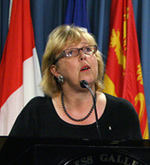 Waiting for Godot on the wet coast: As of Wednesday, September 10, 12:45 PDT, the UBC Election Stock Market for the 2008 Canadian federal election is predicting a somewhat stronger Conservative minority government on October 14 – with 144 seats for the Conservatives, 90 seats for the Liberals, 36 for the New Democrats, 35 for the Bloc Quebecois, and 3 “Others.” (The UBC Election Stock Market’s track record for the 2006 election, btw, was pretty good.)
Waiting for Godot on the wet coast: As of Wednesday, September 10, 12:45 PDT, the UBC Election Stock Market for the 2008 Canadian federal election is predicting a somewhat stronger Conservative minority government on October 14 – with 144 seats for the Conservatives, 90 seats for the Liberals, 36 for the New Democrats, 35 for the Bloc Quebecois, and 3 “Others.” (The UBC Election Stock Market’s track record for the 2006 election, btw, was pretty good.)
Another highly useful election-watching resource from beautiful BC is Andrew Heard’s Elections site from the Political Science Department at Simon Fraser University. Here the Canada-wide popular vote from the latest Decima poll shows Conservatives 36%, Liberals 28%, New Democrats 15%, Bloc Quebecois 9%, and Greens 9%.
Harper backtracks on Afghanistan? Stephen Harper does seem to be trying to show that giving him at least another minority government won’t be the same as four more years of George W. Bush, etc, etc. First, there’s the Puffin poop apology (as above) and then backing down on Elizabeth May (the same). Now he is also apparently “vowing his government would completely withdraw Canadian troops from Afghanistan in 2011 – a promise that goes beyond a Parliamentary motion this year which merely committed to pull soldiers out of Kandahar province … The statement is a change for Mr. Harper, who had acknowledged in April that it was possible down the road that Canada’s NATO allies might ask Ottawa to extend its Afghan commitment beyond 2011.”
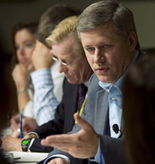 Even in the Prime Minister’s Office in Ottawa, it seems, someone does know how to read Canadian opinion polls. (See, e.g.: “Public support for Afghan mission lowest ever: poll,” CBC News, September 5.) At the same time, as the Vancouver Sun has pointed out: “After six years of sending troops to Afghanistan, Canadians will go to the polls Oct. 14 not knowing how much the war in the Asian country is costing … That’s because parliamentary budget officer Kevin Page, Canada’s newest spending watchdog, has decided not to release a preliminary report into the first full costing of the war.”
Even in the Prime Minister’s Office in Ottawa, it seems, someone does know how to read Canadian opinion polls. (See, e.g.: “Public support for Afghan mission lowest ever: poll,” CBC News, September 5.) At the same time, as the Vancouver Sun has pointed out: “After six years of sending troops to Afghanistan, Canadians will go to the polls Oct. 14 not knowing how much the war in the Asian country is costing … That’s because parliamentary budget officer Kevin Page, Canada’s newest spending watchdog, has decided not to release a preliminary report into the first full costing of the war.”
Stephane Dion may lose badly … but, say what you like, he is starting to show he’s the real class of this election? Stephane Dion has recently confessed that “his biggest handicap as he campaigns for votes … is his difficulty communicating in English, which he blamed on a hearing problem … I have a hearing problem and it may be linked to that,’ the Liberal leader said … I have difficulty to isolate sounds … It may explain the fact that the music of the language is difficult for me to catch.”
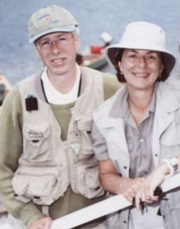 This may be true enough – and it may also finally condemn him to the kind of ultimate results currently predicted by the UBC Election Stock Market. The other morning over breakfast, however, I caught M. Dion on TV, speaking informally to a small crowd of supporters in Montreal, in French (nicely translated into quite good English by someone inside my television set of course). And I was freshly and surprisingly impressed by his civility, conviction, intelligence, and forward-looking humanity – even though I have seen and heard him talk (or try to) in both official languages many times now.
This may be true enough – and it may also finally condemn him to the kind of ultimate results currently predicted by the UBC Election Stock Market. The other morning over breakfast, however, I caught M. Dion on TV, speaking informally to a small crowd of supporters in Montreal, in French (nicely translated into quite good English by someone inside my television set of course). And I was freshly and surprisingly impressed by his civility, conviction, intelligence, and forward-looking humanity – even though I have seen and heard him talk (or try to) in both official languages many times now.
As I have been from time to time in the past, I was struck by the thought that, at least for English-speaking Canadians of my particular variety, Canada is a country that probably works best when it is run by a French-speaking politician from Quebec. This may well be a thought that it is easier to have if you live in Ontario (or Atlantic Canada?) than if you live out West. And there are certainly other times when I think French-speaking people from Quebec seldom try at all hard enough to understand and appreciate their English-speaking compatriots in the rest of Canada. (To say nothing of outright separatists like the congenial M. Duceppe, etc, etc.) And it probably is one of Stephen Harper’s strengths at the moment that he represents English-speaking Canada beyond Quebec better than any prime minister we have had in a good many years.
Even so, I do find myself that, when I’m listening very closely, it is Stephane and not Stephen who is speaking up most strongly and resolutely for the particular Canadian values to which I am most attached.
 Carol Goar shrewdly observed in the Toronto Star this morning that: “The preliminary consensus among the pollsters and pundits is that Stphane Dion’s [“Green Shift”] campaign platform is a dud. It is too complicated for the Liberal leader to explain, too big for voters to digest and too easy for the opposition parties to distort.” In the end, however, M. Dion and his Liberal team are “offering Canada a chance to show some leadership on climate change … They’re offering voters a practical – and relatively painless – way to wean themselves off fossil fuels. They’re offering baby boomers a chance to clean up their act before passing the stewardship of the country to a new generation … The Green Shift won’t be an easy sell. It won’t win plaudits from the image makers, strategists and ad executives whose gaze is riveted on the rolling polls. But it’s the best thing Dion’s got going for him.”
Carol Goar shrewdly observed in the Toronto Star this morning that: “The preliminary consensus among the pollsters and pundits is that Stphane Dion’s [“Green Shift”] campaign platform is a dud. It is too complicated for the Liberal leader to explain, too big for voters to digest and too easy for the opposition parties to distort.” In the end, however, M. Dion and his Liberal team are “offering Canada a chance to show some leadership on climate change … They’re offering voters a practical – and relatively painless – way to wean themselves off fossil fuels. They’re offering baby boomers a chance to clean up their act before passing the stewardship of the country to a new generation … The Green Shift won’t be an easy sell. It won’t win plaudits from the image makers, strategists and ad executives whose gaze is riveted on the rolling polls. But it’s the best thing Dion’s got going for him.”
Suitably qualified and adapted in practice, it may well be the best thing on offer for the Canadian future in the present federal election campaign too – even if it is Stephen Harper who wins in the end, for various other good and bad reasons. In any event, it already strikes me that anyone who thinks there is some “music of the language” to English deserves quite a few English-speaking Canadian votes. And, while I hope to remain a good neutral analyst of the current campaign as it unfolds, Stephane Dion’s informal speech in French from Montreal, the other day on TV, has pretty much convinced me about how I’m going to vote myself.
Randall White is the author of a number of books on Canadian history and politics, including: Voice of Region: The Long Journey to Senate Reform in Canada and Ontario Since 1985. He has also worked as a public policy consultant at all three levels of government in Canada. He will continue to report and comment on electoral developments in Canada (and the United States) between now and October 14.You can complain about what he writes by emailing him at rwhite@eastendbooks.com.
(3) EARLIER REPORT FOR SEPTEMBER 8 …
 Conservatives jump into too big a lead in polls too fast? Forget about just flirting with a majority government. According to a new “Segma poll, taken for La Presse newspaper” in Quebec, support for Stephen Harper’s Conservatives Canada-wide is currently riding at an astounding “43 percent, which the pollsters said would translate into 183 of the 308 seats in the House of Commons.”
Conservatives jump into too big a lead in polls too fast? Forget about just flirting with a majority government. According to a new “Segma poll, taken for La Presse newspaper” in Quebec, support for Stephen Harper’s Conservatives Canada-wide is currently riding at an astounding “43 percent, which the pollsters said would translate into 183 of the 308 seats in the House of Commons.”
This is 56 seats more than Mr. Harper’s party had at dissolution on Sunday – and would require very strong results in Quebec and BC, and no doubt Ontario too. An ongoing Strategic Counsel poll of 45 “battleground” ridings in these three provinces apparently is finding “that the Conservative Party has made significant gains over its performance of 2006, while its main opponents in all three regions have lost ground.” But recent Environics and Ekos polls still have the Conservatives nationally at 38% and 37%. Until still further polls confirm the Segma findings, something seems at least a bit fishy in the state of Denmark.
A New Democrat Minority Government? What is Stephen Harper Smoking? I might have been hallucinating while taking vitamin pills with breakfast this morning. But I thought I saw something on the CP24 TV channel in Toronto that said Stephen Harper was claiming there could even be an NDP minority government when the results finally come in on October 14.Out west this may sound almost reasonable. In Ontario it just seems insane.
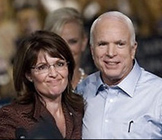 Is the Sarah Palin bounce behind the new Segma poll in Canada too? You have to be careful with opinion polls, of course. As my reflections on comments in the Dallas Morning News suggest [see item (1) below], new US Republican Vice Presidential candidate Sarah Palin may not be quite as big a stick of dynamite as the current so-called Sarah Palin bounce in US opinion polls certainly do seem to imply.
Is the Sarah Palin bounce behind the new Segma poll in Canada too? You have to be careful with opinion polls, of course. As my reflections on comments in the Dallas Morning News suggest [see item (1) below], new US Republican Vice Presidential candidate Sarah Palin may not be quite as big a stick of dynamite as the current so-called Sarah Palin bounce in US opinion polls certainly do seem to imply.
At the same time, there now appears little doubt that there has been some kind of Sarah Palin bounce in the opinion polls – to the great advantage of John McCain, and unfortunate disadvantage of Barack Obama. As a report from the Telegraph in the UK explains: “A USA Today/Gallup conducted on Friday, the last day of the convention, and over the weekend gave Mr McCain, who until very recently had been trailing narrowly in all polls, a staggering 10-point lead among likely voters … Gallup’s daily tracking poll put the Republican up by three, Rasmussen tracking had him up one while three other polls recorded a tie.”
 Similar intelligence can be gleaned closer to home, in the Washington Post: “Early indications suggest that Palin power has turned the race upside down. McCain has leaped to the lead in a new USA Today/Gallup national poll. A brand new CNN/Opinion Research Center poll released moments ago, confirmed the USA Today/Gallup results. Among registered voters, Obama and McCain were knotted at 48 percent … The survey shows McCain at 50 percent and Obama at 46 percent among registered voters – the first time since an early January USA Today/Gallup survey that the Republican was at the critical 50 percent mark … Among those most likely to vote the gap was even broader with McCain leading Obama 54 percent to 44 percent.”
Similar intelligence can be gleaned closer to home, in the Washington Post: “Early indications suggest that Palin power has turned the race upside down. McCain has leaped to the lead in a new USA Today/Gallup national poll. A brand new CNN/Opinion Research Center poll released moments ago, confirmed the USA Today/Gallup results. Among registered voters, Obama and McCain were knotted at 48 percent … The survey shows McCain at 50 percent and Obama at 46 percent among registered voters – the first time since an early January USA Today/Gallup survey that the Republican was at the critical 50 percent mark … Among those most likely to vote the gap was even broader with McCain leading Obama 54 percent to 44 percent.”
As the Post also notes: “It’s always dangerous to draw conclusions about the trend of a presidential race based on a single poll taken in the immediate aftermath of a convention. And, a look at all national surveys taken so far this month suggest a more mixed result.” Still, up here in Canada, you do have to wonder.
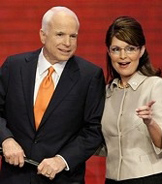 One of the reasons for Prime Minister Harper’s decision to finally call a quick Canadian election, in spite of his own fixed election date legislation for October 19, 2009, has seemed to be a concern that an Obama victory in the US would make it that much harder for Conservatives to win in Canada. (So have your Canadian election before there finally is an Obama victory in the US – and blunt the north-of-the-border impact of the event before it happens.)
One of the reasons for Prime Minister Harper’s decision to finally call a quick Canadian election, in spite of his own fixed election date legislation for October 19, 2009, has seemed to be a concern that an Obama victory in the US would make it that much harder for Conservatives to win in Canada. (So have your Canadian election before there finally is an Obama victory in the US – and blunt the north-of-the-border impact of the event before it happens.)
Now it suddenly seems that, thanks to the almost unbelievable sudden impact of Ms. Palin (as some of us see it at any rate) it’s John McCain who has the forward bounce. And it’s this impact that just may be putting Stephen Harper much closer to his cherished majority government than anyone (including Mr. Harper himself) has yet thought possible. I still can’t really believe it myself – as much as some technical side of me does appreciate the ironic surprise. There is just so little substance (and so much nasty hostility) to Ms. Palin and her bounce (and to so much about the Conservative Party of Canada and Mr. Harper’s current bullying election too) that it would be a far too pessimistic slight on the human race to accept that “Palin power has turned the race upside down,” without much, much more convincing evidence than we have had so far.
Randall White is the author of a number of books on Canadian history and politics, including: Voice of Region: The Long Journey to Senate Reform in Canada and Ontario Since 1985. He has also worked as a public policy consultant at all three levels of government in Canada. He will continue to report and comment on electoral developments in Canada (and the United States) between now and October 14.You can complain about what he writes by emailing him at rwhite@eastendbooks.com.
(2) EARLIER REPORT FOR SEPTEMBER 6 …
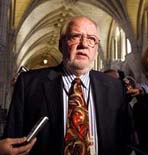 More on Conservative majority? Or not? There is now one more opinion poll which suggests the Conservatives are within striking distance of winning a majority government in the election that Stephen Harper is calling for October 14. (At least as such things are judged by our current somewhat absurd Canadian democracy.) This Environics survey found 38% Conservatives, 28% Liberals, 19% NDP, 8% Bloc Qubcois, and 7% Greens. Yet another new poll, however, reports that “Conservatives not ‘flirting with majority.” This survey, from Ipsos, found Conservatives 34%, Liberals 31%, NDP 14%, Bloc Qubcois 11%, and Greens10%. So … certainly don’t bet the farm on anything yet.
More on Conservative majority? Or not? There is now one more opinion poll which suggests the Conservatives are within striking distance of winning a majority government in the election that Stephen Harper is calling for October 14. (At least as such things are judged by our current somewhat absurd Canadian democracy.) This Environics survey found 38% Conservatives, 28% Liberals, 19% NDP, 8% Bloc Qubcois, and 7% Greens. Yet another new poll, however, reports that “Conservatives not ‘flirting with majority.” This survey, from Ipsos, found Conservatives 34%, Liberals 31%, NDP 14%, Bloc Qubcois 11%, and Greens10%. So … certainly don’t bet the farm on anything yet.
Could the excellent Mme Jean say “No Prime Minister”? There is still some lingering debate over whether Governor General Michaelle Jean could actually refuse Prime Minister Harper’s advice to dissolve Parliament and call a fresh election for October 14, as proffered on the morning of Sunday, September 7. On the side that she absolutely cannot, e.g., are constitutional law professor Patrick Monahan and historian Jack Granatstein. On the opposite side are constitutional law professor Errol Mendes and historian Michael D. Behiels. To me what this debate finally shows is that we need to reform our present method of selecting the Governor General of Canada – before the next Governor General takes office in September 2010.
In some ways the Harper government’s own fixed election date law – which prescribes that the next Canadian federal election is to be held on October 19, 2009 – is only incidental to the broader issue of the Governor General’s powers here.
 As reported in the Winnipeg Sun, e.g.: “Some experts say Harper is within his rights to pull the plug [for October 14, 2008 – long before the now legal fixed date], because the fixed-date election law leaves intact the Governor General’s power to dissolve Parliament at her discretion.” According to Professor Mendes, however, “while the fixed-date election statute doesn’t abrogate the powers of the Governor General, it clearly aims to limit those of the prime minister … What the statute has done is leave (an election) pretty much to the discretion of the Governor General … but the whole point of the statute was to essentially do away with the discretion of the prime minister to ask for one.'”
As reported in the Winnipeg Sun, e.g.: “Some experts say Harper is within his rights to pull the plug [for October 14, 2008 – long before the now legal fixed date], because the fixed-date election law leaves intact the Governor General’s power to dissolve Parliament at her discretion.” According to Professor Mendes, however, “while the fixed-date election statute doesn’t abrogate the powers of the Governor General, it clearly aims to limit those of the prime minister … What the statute has done is leave (an election) pretty much to the discretion of the Governor General … but the whole point of the statute was to essentially do away with the discretion of the prime minister to ask for one.'”
Judging from just a little between the lines of what Professor Mendes’s fellow constitutional law teacher Patrick Monahan had to say, the other night on Steve Paikin’s TV Ontario program, The Agenda, Professor Monahan’s crucial point is that what Professor Mendes says is all well and good, but the Governor General nowadays has no independent “discretion” in anything. Because the Governor General is merely appointed, and the Prime Minister elected, Professor Monahan seems to be telling us, the Governor General in our present-day democracy must always follow the Prime Minister’s advice.
Or, as Professor Monahan wrote in the Globe and Mail a week or so ago: “In short, the Governor-General (and thus, indirectly, the Prime Minister) retains full legal authority to dissolve Parliament and trigger an election at any time … If the Prime Minister does seek an election this week, it may well be inconsistent with the political objectives underlying the fixed-election-date legislation, but not the actual requirements of the law as enacted.” [The italics here are mine.]
 To me, again, this is all logical enough, when you consider that Governor General Jean was appointed by former Liberal prime minister, Paul Martin. Her credibility to exercise any independent discretion, in the exercise of the traditional reserve or residual powers of the constitutional monarchy in Canada, with respect to advice from Mr. Martin’s successor, the Conservative prime minister Stephen Harper, is virtually non-existent. (And it would be even less, with respect to advice from Mr. Martin himself, who appointed her in the first place.)
To me, again, this is all logical enough, when you consider that Governor General Jean was appointed by former Liberal prime minister, Paul Martin. Her credibility to exercise any independent discretion, in the exercise of the traditional reserve or residual powers of the constitutional monarchy in Canada, with respect to advice from Mr. Martin’s successor, the Conservative prime minister Stephen Harper, is virtually non-existent. (And it would be even less, with respect to advice from Mr. Martin himself, who appointed her in the first place.)
Yet the big trouble with this resolution of the issue is that, as a matter of constitutional theory and practice in our present-day parliamentary democracy, the traditional reserve or residual powers of the constitutional monarchy or Governor General in Canada remain important – as a democratic check on the increasing centralized power of the “friendly dictator” prime minister.
The problem with Professor Monahan’s theory, as it stands, is that it allows the prime minister to do almost anything, as a result of the rather mindless and certainly haphazard way in which the former first self-governing dominion of the British empire has gradually evolved into an independent, democratic national state. (The prime minister has in effect become the kind of almost absolute monarch that the Mother of Parliaments long ago beheaded, to cut down to a proper constitutional size.) In Canada today at any rate the obvious solution is to reform the selection method for the office of Governor General – so as to give the holder of this office the kind of credibility required to show independent discretion in the exercise of her (or his) reserve or residual powers, in those (comparatively rare) cases where they are important, as a democratic check on the potential abuse of overweening prime ministerial power.
All this is so logical nowadays that it has been raised by former Governor General Adrienne Clarkson, in her still comparatively recently published memoirs. But the reformed selection method for the office of Governor General proposed by Mme Clarkson is, well, wimpy at best – and nowhere near democratic enough to enhance the credibility of the office to the extent required.
 To get into the matter further at this point, in the context of reporting on the Canadian federal election that Prime Minister Harper is no doubt about to unleash upon us, with the excellent Mme Jean’s full co-operation (unless something quite surprising, and quite a lot like a constitutional crisis, really is about to happen?) would be just too tedious.
To get into the matter further at this point, in the context of reporting on the Canadian federal election that Prime Minister Harper is no doubt about to unleash upon us, with the excellent Mme Jean’s full co-operation (unless something quite surprising, and quite a lot like a constitutional crisis, really is about to happen?) would be just too tedious.
On purpose and otherwise, however, Mr. Harper has over the past two and a half years and more raised a number of important questions about much-needed structural reforms in Canada’s present parliamentary democracy (including Senate reform, of course). As his current attitude towards his own fixed-date election law suggests, he may not always be so concerned to take these reforms as seriously in practice as he talks about in theory. But they nonetheless remain increasingly important.
Somewhere down the road, hopefully, Canadian history will probably acknowledge Mr. Harper’s (not always straightforward) contributions to bringing these reforms about – and strengthening Canada for the future in the process. Meanwhile, we are going to be having an election on October 14, just because the current minority prime minister (elected by just over 36% of the active Canadian people) has decided he wants one, for his own good reasons. And as even his own democratically reformed law now stands, it does seem that he can get away with it. (Michael Behiels has offered a nice explanation of the prime minister’s thought processes here: “In short, the unintended consequence of Bill C-16 [the fixed-date election law] was to transfer the power to provoke an election to the leader of the opposition. Mr. Harper had inadvertently given up control over the political agenda of his government. Now that Mr. Harper is eager to hold an election before the Canadian economy tanks and while the polls appear to favour his party, he has decided to flout his own law.”)
Randall White is the author of a number of books on Canadian history and politics, including: Voice of Region: The Long Journey to Senate Reform in Canada and Ontario Since 1985. He has also worked as a public policy consultant at all three levels of government in Canada. He will continue to report and comment on electoral developments in Canada (and the United States) between now and October 14.You can complain about what he writes by emailing him at rwhite@eastendbooks.com.
(1) EARLIER REPORT FOR SEPTEMBER 4 …
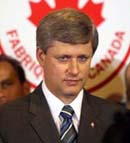 Harper will drop in on Mme Jean one day before scheduled by-elections. The Vancouver Sun is reporting today that “Prime Minister Stephen Harper will visit Gov. Gen. Michaelle Jean early Sunday morning [September 7] and ask her to dissolve the 39th Parliament … Canadians will vote Oct. 14, after the shortest campaign permitted by law.”
Harper will drop in on Mme Jean one day before scheduled by-elections. The Vancouver Sun is reporting today that “Prime Minister Stephen Harper will visit Gov. Gen. Michaelle Jean early Sunday morning [September 7] and ask her to dissolve the 39th Parliament … Canadians will vote Oct. 14, after the shortest campaign permitted by law.”
Meanwhile the advance polls for the presumably now defunct September 8 by-elections in Ontario and Quebec have already seen some action. According to Le Devoir yesterday: “Dans Westmount-Ville-Marie, 514 personnes ont exerc leur droit de vote hier.” More could follow even this weekend, apparently. Somehow the mild last-minute irrationality of all this seems to say something about the general election Mr. Harper is bullying us into.
Early polls. As best I can make out, the three most recent opinion polls lend themselves to three quite different predictions about the ultimate outcome on October 14: Conservative majority; Conservative minority; or Liberal minority. Take your pick, for the moment at any rate.
It may still be remotely possible that the Vancouver Sun or more exactly its sources in Ottawa are wrong, and the three by-elections in Ontario and Quebec will go ahead as scheduled on Monday, September 8. But the chances of this now seem …. mmm, say less than 1%?
 Will Stephane Dion be the mouse that roars? Technically, another Conservative minority government still looks like the most likely prospect, from the standpoint of political rocket science, all things considered, etc. But the big question here of course is, if this actually is what’s going to happen, then why are we bothering to have another election right now?
Will Stephane Dion be the mouse that roars? Technically, another Conservative minority government still looks like the most likely prospect, from the standpoint of political rocket science, all things considered, etc. But the big question here of course is, if this actually is what’s going to happen, then why are we bothering to have another election right now?
Apart from worries about how an Obama victory on November 4 down south might hurt prospects for even a Conservative minority government in Canada further down the road, the only sensible answer is that Mr. Harper still thinks he has a chance of winning a Conservative majority government. Not because anything remotely like a majority of the Canadian people want such a thing. But because our current Canadian political system has evolved to the point where a party does not need anything at all like a majority of the popular vote to win a majority of seats in Parliament. According to pollsters, 40% will do. And if the geographical distribution of your vote is exactly right, the historical record shows rather less than that can work too.
Yet the more interesting prospect, again technically, is a Liberal minority government (which would also at least make having another election right now worthwhile). A big political worry is that a Liberal minority government would lack support in Western Canada – or would have to rely on uncertain New Democrat partners in Parliament to bolster its western support. There are nonetheless two interesting technical or analytic questions.
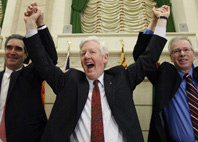 First, what are the chances that increasingly strong support for Barack Obama in the United States during the Canadian campaign (assuming that is what happens – which may not of course prove correct) will spill over the unfortified border (as George W. Bush calls it), and work to the Liberals’ advantage? It is all very well to say that historically US elections have not had all that much impact on Canadian elections. The 2008 US election is proving to be quite unusual historically. And something similar may finally prove true of the 2008 Canadian election too.
First, what are the chances that increasingly strong support for Barack Obama in the United States during the Canadian campaign (assuming that is what happens – which may not of course prove correct) will spill over the unfortified border (as George W. Bush calls it), and work to the Liberals’ advantage? It is all very well to say that historically US elections have not had all that much impact on Canadian elections. The 2008 US election is proving to be quite unusual historically. And something similar may finally prove true of the 2008 Canadian election too.
Second, what are the chances that Stephane Dion’s past tendencies to finally perform much above the general expectations of him will finally raise him from the ashes in the 2008 Canadian election? (No one ever expected him to win the Liberal leadership either, or survive his unpopular Clarity Act assignment in Quebec, etc, etc.)
This remains a great mystery for the moment. M. Dion’s Green Shift environmental plan certainly has big risks (for everyone except ardent environmentalists?). But he has lately moved to try to address these problems. Liberal pollster Michael Marzolini has been advising his biggest clients that Stephen Harper’s leadership style is vulnerable, despite (or perhaps because of) all the talk about what a strong leader he is. M. Dion is in some ways (and unlike Mr. Harper) the kind of person many Canadians profess to admire in private. Especially in the parts of the country where the Liberals continue to enjoy serious strength, the economy is almost certainly the biggest issue. And M. Dion has lately been attacking Mr. Harper a bit nicely on that. His English is not good, no doubt, but then neither was Jean Chretien’s. (And his English is a lot better than the French spoken by most English-speaking Canadians, no doubt.) Will he be the mouse that roars in the end? It at least seems impossible to say for certain that he won’t be right now.
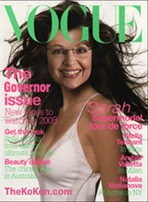 How is Palin doing deep in the heart of Texas? The online comments to the Dallas Morning News report, “Palin portrays herself as hockey mom with inner steel,” make you wonder about how the new US Republican vice presidential candidate is really going down among the just plain folks in friendly red-state markets.
How is Palin doing deep in the heart of Texas? The online comments to the Dallas Morning News report, “Palin portrays herself as hockey mom with inner steel,” make you wonder about how the new US Republican vice presidential candidate is really going down among the just plain folks in friendly red-state markets.
E.g.: “And Levi having to join the military since he never graduated highschool. The same for her son already in the service. She needs to walk the walk if she talks the talk…We will find out Palin can’t and has not. Kids pregnant no one graduates sounds like some one in control” ; “I guess McCain is going after the Jerry Springer vote, Witness the inclusion of her daughter’s baby’s daddy. The only thing I didn’t see … was the shotgun for the wedding” ; “Sorry I don’t want 4 more years of George Bush! And for the record i am all for women that want to work and have a family but i do not think that this woman can get the job done..”
Also note the Dallas Morning News article: “Democrats: Sarah Palin delivers punch lines, little else,” with its comments from “Rep. Debbie Wasserman-Schultz, D-Fla,” who “noted acidly that Alaska has fewer people than her congressional district, and just 20 months ago, Ms. Palin was running a town with 8,000 people and a budget of just $12 million … That qualifies her to have her hand on the tiller of American foreign policy in the event that, God forbid, something happens to John McCain? … What relevant experience does Sarah Palin have? … As the McCain campaign constantly reminds us, this is a dangerous world.'”
Canadians of course can’t help but find it interesting that Ms. Palin calls herself a “hockey mom.” And her joke about how the only difference between hockey moms and pit bulls is “lipstick” will no doubt appeal to some of Mr. Harper’s Conservative supporters in Canada too. But at some point enough people in both Canada and the United States might remember that the economy was actually working better when Bill Clinton’s Democrats were running Washington, and both Jean Chretien’s and Paul Martin’s Liberals were in charge on Parliament Hill (in what an earlier generation called “the last lumber village before the North Pole”).
Randall White is the author of a number of books on Canadian history and politics, including: Voice of Region: The Long Journey to Senate Reform in Canada; Ontario Since 1985; and (with the Toronto artist Michael J. Seward), On the Road in the GTA: An eclectic guide to the exurban sprawl of Greater Toronto. He has also worked as a public policy consultant at all three levels of government in Canada. He will continue to report and comment on electoral developments in Canada (and the United States) between now and October 14.You can complain about what he writes by emailing him at rwhite@eastendbooks.com.
